

New column: Derek Boylen on the importance of Family Page 10
Australia’s
Beautiful picture: the delight of French film Les Choristes Page 14
Dinner for two in The Record’s
Details: Page 4
THURSDAY
JANUARY 27, 2005
Perth, Western Australia $1
Big impression: Perth Theology of the Body course is a hit Page 5
$1.2 million!
Perth Catholics give generously to tsunami appeal
In Australia Caritas has raised $9 million. World wide, Catholics have given half a billion dollars to aid for victims of Boxing Day tsunamis.
■ By Jamie O'Brien
A month after the terrible tsunami disaster that rocked the world, Perth Catholics have raised more than $1.2 million, the head of Caritas in Perth announced on Tuesday.
And on a national scale, Caritas Australia has received $9 million in donations with further donations still expected.
“Here in the Perth office, we have witnessed the most extraordinary level of generosity and good will from the Australian public to help those affected by the tsunami and in response we would like to say a huge ‘thank you’, Caritas Perth Director Ann Fairhead told The Record.
Mrs Fairhead said she believes the support has been overwhelming because of the natural causes of the disaster, and the sudden loss of so many lives.
Money raised by Caritas in Australia is being delivered through Caritas long-term partners in affected countries, including the Jesuit Refugee Service and the US Catholic Relief Services in Indonesia; Caritas in Sri Lanka and India; the Catholic Office for Emergency Relief and Refugees in Thailand and other programs of the Catholic Church in Thailand.
Some of the key responses to the disaster and on-going activities have included emergency health assistance to more than 50,000 affected families in Sri Lanka, supply of clean drinking water to 457,000 displaced people in Indonesia, supply of sanitation
Continued on Page 3
Chinese New Year dispensation

SERVING THE PEOPLE?
Affluent nations, please take note:
The new Compendium of Catholic social teaching looks at the basic principles of economic justice.
Pages 7-9

New head for Health
The University of Notre Dame Australia has announced the appointment of Professor Julie Quinlivan as the Foundation Dean of Health and head of the School of Medicine at its Sydney Campus.

Professor Quinlivan is currently Associate Professor of Obstetrics and Gynaecology at the University of Melbourne. She is the head of the Gold Maternity Care program and consultant Obstetrician and Gynaecologist at the Royal Women’s Hospital in Melbourne. She is also a senior consultant in Adolescent Obstetrics & Gynaecology at the Sunshine Hospital in Melbourne.
Notre Dame’s Vice Chancellor, Dr Peter Tannock, said Professor Quinlivan had extensive experience in teaching, medical practice and research in Western Australia, South Australia and Victoria.
“She is an exceptional young woman who will bring great quality and energy to the development of the College of Health and the Schools of Medicine and Nursing in Sydney,” Dr Tannock said.
Passion receives 3 nominations
Mel Gibson’s The Passion of the Christ has been nominated for three Academy Awards.
The 2004 movie about the passion and death of Jesus received Oscar nominations for original score, cinematography and makeup. The Awards will be presented on February 27 in Los Angeles.
DUELLING WITH DARWIN
Scientific debate has raged for decades between Creationists and Evolutionists.
Now there’s a third theory, and it’s called: Intelligent Design.

soon to be on the Web
Western
Award-winning Catholic newspaper
THE PARISH. THE NATION. THE WORLD.
Page 16
Asian youth dressed in traditional costumes hold Chinese decorations during a Mass for the Chinese New Year at the Cathedral of Our Lady of the Angels in Los Angeles. Archbishop Barry Hickey has announced a special dispensation from the traditional Ash Wednesday fast and abstinence for Asian Catholics in the Archdiocese of Perth, who will celebrate Chinese New Year this year on Ash Wednesday, February 9. Archbishop Hickey has asked parish priests to inform congregations of the dispensation during this weekend's Masses.
Photo: Victor Aleman, The Tidings
INDEX Editorial/Letters - Page 6 I say, I say - Page 11 The World - Pages 12-13 Reviews - Page 14 Classifieds - Page 15
Professor Quinlivan
WIN!
READER SURVEY COMPETITION
Sufferers need not feel alone
n By Jamie O’Brien
Mental Health Support
Groups are now operating in the Archdiocese to provide an opportunity for sufferers to meet for coffee and a chance to talk about their life.
Harry Mithen from the Leederville Mental Health Support group said there has been a surge in the need for parish groups such as these.
The Leederville parish mental health group meets every second Monday at St Mary’s Parish Centre from 10am.
The groups also aim to offer information on the availability of local professional support, telephone support in times of distress and support for people who have personal experience of what it means to have a psychiatric problem.
This could also involve caring for mental illness sufferers.
Barbara Harris, from the Emmanuel Centre said the fact that people are coming to the groups means that they are meeting a need.
They will be able to allow people to see that the Church is concerned about their wellbeing and encourage them do something
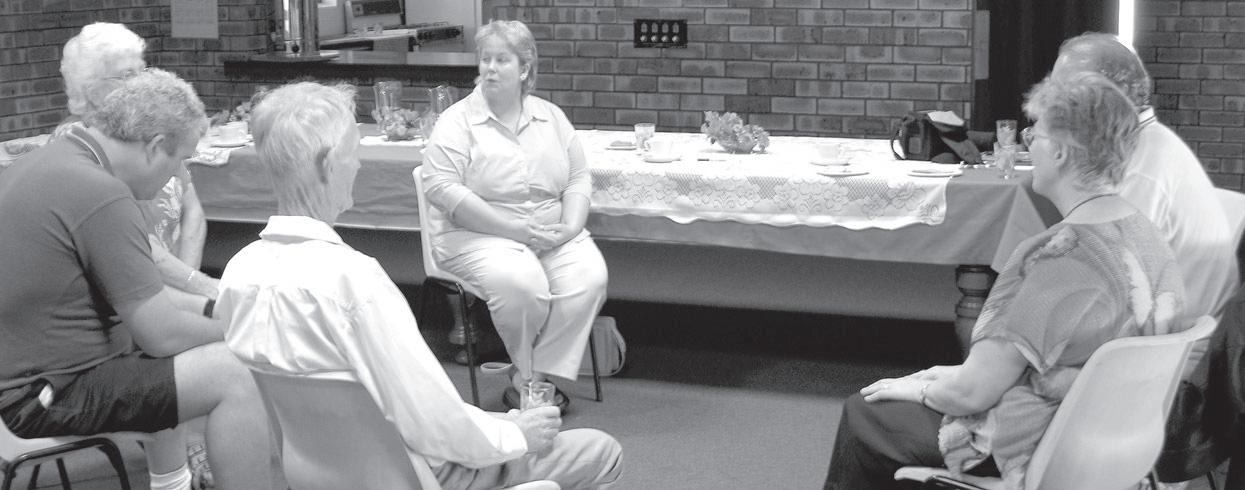
about their difficulties and sufferings through its loving and compassionate nature, she said.
Mrs Harris has attended group sessions in most parishes and said it is has been good to see that each group is operating in a different manner.
Each of the groups attracts, on average, between 10 and 12 people. In the past few years groups have also begun in the Eastern Hills region and across other areas of the diocese, which Mrs Harris says works well as sometimes parishioners do not want others in the parish to know their business
Eucharist, not music, focus
DALLAS (CNS) - The celebration of the Eucharist is “the supreme act of worship” for Catholics, and is at the “very heart of our religion,” a top Vatican cardinal told a crowd of nearly 2,000 gathered in Dallas for a liturgical conference. Nigerian Cardinal Francis Arinze, prefect of the Congregation for Divine Worship and the Sacraments, was the keynote speaker at the liturgical conference, held from January 18-21. According to the Second Vatican Council, the Eucharist is “’a sacrament of love, a sign of unity, a bond of charity, a paschal banquet’ where Christ is consumed and Jesus’ glory is given to us,” Cardinal Arinze said. “It is the essence of religion at its heart and at its height.”
cathrec@iinet.net.au
PO Box 75 Leederville, WA 6902
Subscriptions
Kylie Waddell administration@therecord.com.au
PO Box 75 Leederville, WA 6902
Advertising
Eugen Mattes, Carole McMillen advertising@therecord.com.au
PO Box 75 Leederville, WA 6902
The Record
587 Newcastle St, Leederville WA 6902
Tel: (08) 9227 7080
Fax: (08) 9227 7087
Journalists
Jamie O'Brien jamieob@therecord.com.au
Bronwen Clune clune@therecord.com.au
Mark Reidy reidyrec@iinet.net.au
and wish to remain anonymous.
Ms Harris said the majority of people attending are Catholic, but non-Catholics are also welcome.
While the groups are not there to solve a person’s problems, their core values are compassion, respect, acceptance, justice, trust, understanding and hospitality.
For Harry Mithen and Donna Moxey, from the Whitfords Mental Health Support Group, becoming involved in supporting people with a mental illness became even more special after they attended a Pastoral Care Course at Graylands Hospital. “The course gave us a
greater understanding that couldn’t have been achieved otherwise,” Mr Mithen said.
At a recent group meeting in Leederville, sufferers talked about the difficulty they face in coming out of the cycle of depression.
“There is no feeling of hope, effort, or inclination to do something about the problems you are experiencing,” said one man who didn’t want to be identified. He also said that the longer a person with depression suffers without seeking help, the more difficult it is to emerge from it. The group also spoke about the feeling of shame

and embarrassment that contribute to many people with mental illness being isolated from others.
Mr Mithen said that often mental illness sufferers want to do something about their problems but are too afraid.
“The general belief is that if you’ve got a broken arm you don’t mind boasting about it but if you’ve been to Graylands you don’t talk about it,” he said. The general belief amongst mental illness sufferers is that by going to Graylands, a person has lost control of their life.
All the sufferers at the recent group meeting in Leederville agreed that time is the biggest healer.
Mr Mithen, a former primary school teacher who used to be involved in teaching students with Special Needs, said he became involved with Mental Health Support Groups because he wanted to understand more about the mental illnesses that people suffer.
“I wanted to show people who suffer a mental illness that there are people who support them and will do what they can to help and love them as they are,” he said.
For more information contact Barbara Harris at the Emmanuel Centre on (08) 9328 8113.






Position available
Part time medical receptionist (4 days) to work in a small team. Desir able qualitities include:
● good interpersonal skills
● confidence with Microsoft software packages
● office management experience preferred
● appreciation and support of Catholic ethics on ‘Culture of

Page 2 January 27, 2005, The Record
contact
to the Editor
How to
The Record Letters
Why not stay at STORMANSTON HOUSE 27 McLaren Street, North Sydney Restful & secure accommodation operated by the Sisters of Mercy, North Sydney. • Situated in the heart of North Sydney and short distance to the city • Rooms available with ensuite facility • Continental breakfast, tea/coffee making facilities & television • Separate lounge/dining room, kitchen & laundry • Private off-street parking Contact: Phone: 0418 650 661 or email: nsstormtpg.com.au VISITING SYDNEY A LIFE OF PRAYER ... are you called to the Benedictine life of divine praise and eucharistic prayer for the Church? Contact the: Rev Mother Cyril, OSB, Tyburn Priory, 325 Garfield Road, Riverstone, NSW 2765 www.tyburnconvent.org.uk TYBURN NUNS CRUISING • FLIGHTS • TOURS Live your travel dream Personal service and experience will realise your dream Live your travel dream ® A division of Interworld Travel Pty Ltd Lic No.9TA796 Est 1981 200 ST.GEORGE’S TERRACE,PERTH,WA 6000 TEL 61+8+9322 2914 FAX 61+8+9322 2915 email:admin@flightworld.com.au www.flightworld.com.au Michael Deering Enquire about our Cashback Offer* * Conditions apply
Centre
FertilityCare
The Australian
for
and NaProTechnology
Life’ issues Please call 9388 1334 for further information, or send CV to 8/10 McCourt St, West Leederville, WA, 6007 by Friday 4 February 2005
Participants and supporters meet at the Leederville Mental Health Group. Mental help groups meeting in parishes provide sufferers and carers with mutual support and help dispel the isolation caused by mental illness.
Body course opens window
■ By Jamie O’Brien
Perth’s Respect Life Office Director Clare Pike said the huge attendance at the Good News about Sex and Marriage seminar series run by her office is because people have seen that the Church is using a language that appeals to people by answering their deepest desires and questions.
A record number of 60 men and women from across the diocese are attending the seminar series on Monday nights. Each session starts with Mass and is followed by a video of a presentation by Christopher West.
Discussion groups are then led
by facilitators who have completed courses in the Theology of the Body at the John Paul II Institute in Melbourne.
Christopher West teaches Theology of the Body and sexual ethics at St John Vianney Theological Seminary in Denver.
He is also a visiting faculty member of the John Paul II Institute for Studies on Marriage and Family in Melbourne.
Miss Pike said the course was possible because all the facilitators who had studied at the John Paul II Institute were in Perth at the same time.
“I really hope that the seeds of good news of the Church’s teaching about sexuality and our body
will be planted in all the people who attend,” Miss Pike said. “A new springtime will flourish in Perth.” Miss Pike also said she hoped that the information is not just learned, but that the lives of people will be changed.
“Deep down we all have this insatiable desire to understand the meaning of our body and its sexual uses and through that to love and be loved as God does,” she said. She said a number of teachers have also been attending the course and have asked how they can bring the message to their students.
Jin Ping Wong, one of the seminar facilitators, made mention of the fact that the series is being
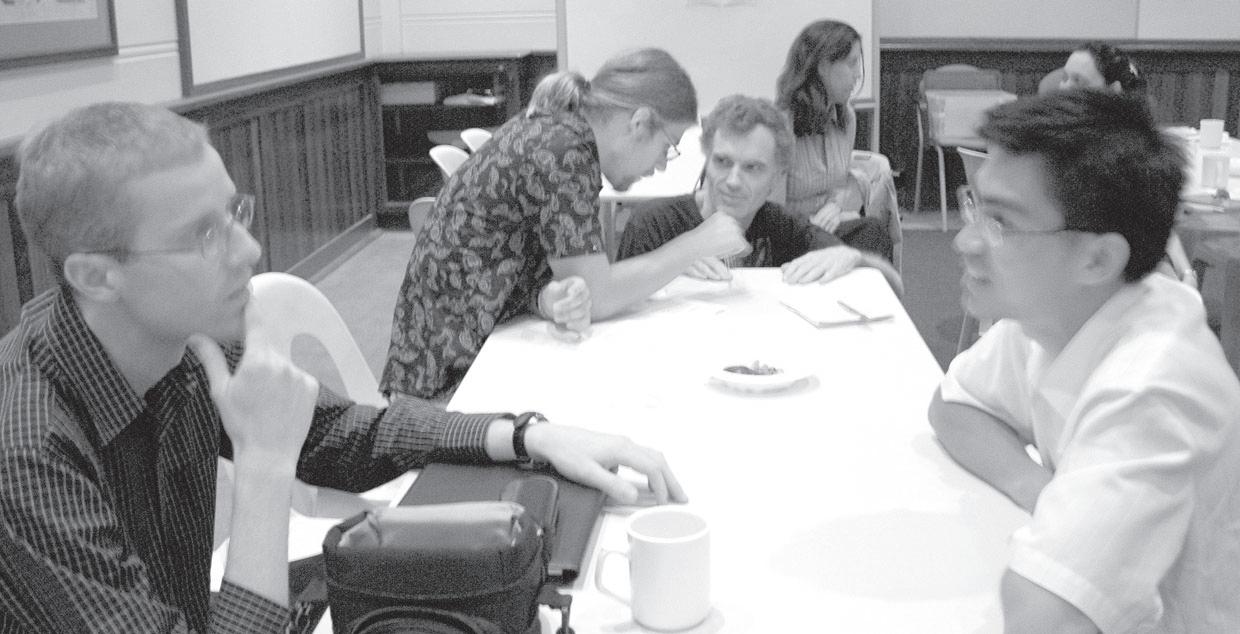
Parishes give $1.2m
Continued from page 1
items to displaced people in Banda Aceh and along the west coast of Indonesia, provision of relief including food and non-food items to 80,000 people in Indonesia; and the provision and construction of interim shelters for 10,000 households in Indonesia.
There is also a focus on the immediate and ongoing psychosocial needs in Thailand for at least 3,000 affected families with trauma counselling already beginning in Sri Lanka, said Jack de Groot, National Caritas Director.
Caritas staff are meeting various needs of the people in Banda Aceh by also distributing Muslim prayer kits at the festival of Eid Adha.
“As a faith-based organisation, we recognise the importance of faith to many people, so as a mark of respect for the festival of Eid, Caritas decided to distribute what we are calling ‘religious kits’, said Caritas National Director Jack de Groot.
According to Mr de Groot, the religious kits contain a prayer mat and traditional clothing items and arrived in time for the festival.
In Indonesia, Caritas Australia has also organised a shelter coordinator, as part of the assessment and design stage for a shelter program on the west coast for 10,000 households.
“We will also establish a local management structure that draws upon our shelter experience in East Timor,” Mr de Groot said.
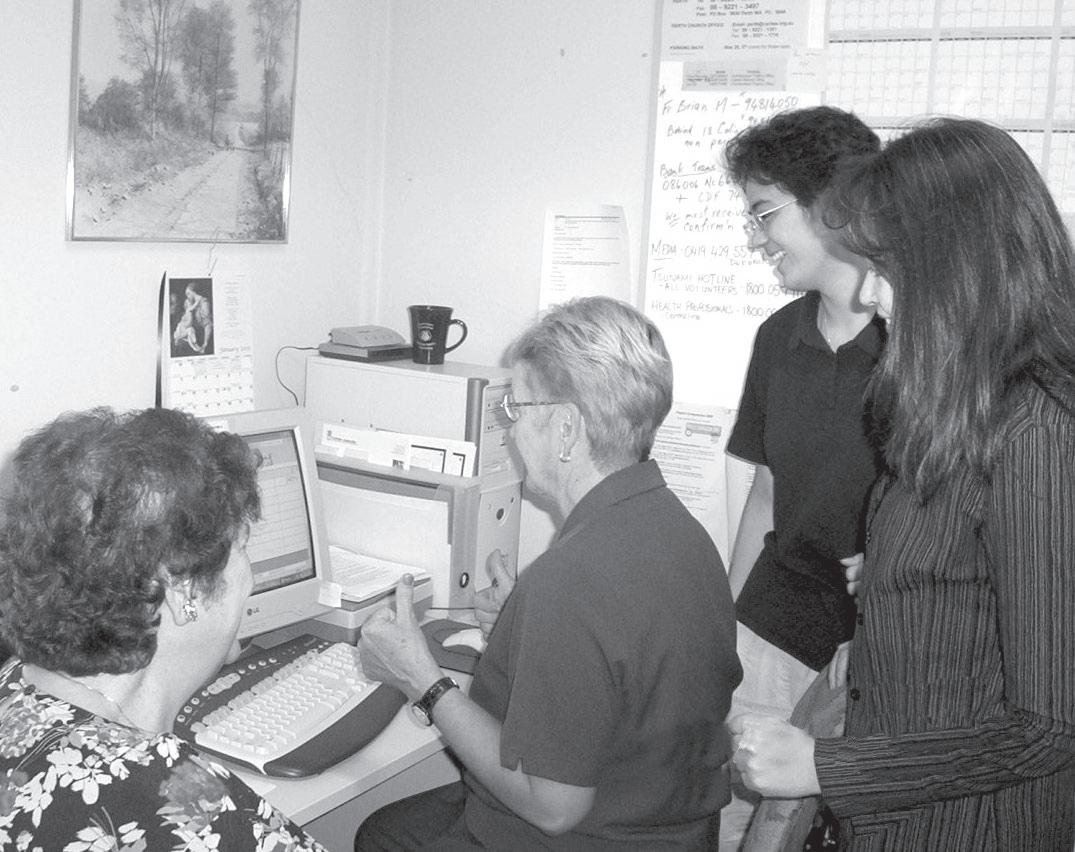
Mr de Groot also said that Caritas Australia expects to place a co-ordinator in Medan, Indonesia for a 12-month period to assist with the liaison between Caritas partners. Many of the affected countries are existing priority areas for Caritas Australia’s long-term development work, with well-established local partnerships already in place, he said.
Caritas Australia’s work in the post-disaster stage will be conducted through local partners.
Mr de Groot said that a vast majority of the rehabilitation and reconstruction work will con-
attended by a number of married couples, including one man who is a grandfather. “Many of them didn’t know what to expect,” he said. “We’ve had more feedback in the last couple of weeks and people are saying they believe it is a topic not widely talked about,” Mr Wong said. “However, it is applicable to everyone’s life.”
Anthony Coyte, also a facilitator of the seminar, said he has seen a need, especially amongst Catholics, to discover what the true meaning of marriage is; “It is not widely known in society today,” Mr Coyte said.
“We have so many questions about sexuality. What this course is doing is presenting a vision of man and woman that underlies everything.” Mr Coyte also said it is important for people to know who they are as men and women, “why it is that we want to join in union with another, getting the answers to that and then applying it to the questions that we have.”
Time for second look: US bishops
The US Conference of Catholic Bishops has launched a major advertising campaign encouraging people to take a “second look” at their views on abortion. The ad campaign, called the “Second Look Project,” presents basic facts about legalised abortion, according to Cathy Cleaver Ruse, director of planning and information in the pro-life secretariat. “Many people still do not understand basic facts about legal abortion - like the fact that abortion is legal through all nine months of pregnancy,” she said in a January 24 announcement.
Polls showing support for Roe described the Supreme Court’s 1973 ruling as “the decision which legalised abortion in the first three months of pregnancy.” Ruse called that description “a flagrant distortion of the truth.” The advertisements direct viewers to a Web site, www.secondlookproject.org, for more information. - CNS

tinue for many years, in some cases up until to 2010. The next up-coming challenge for Caritas Australia is Project Compassion, to take place on Sunday February 6.
“It is a challenge for all of us to continue to meet the needs of our Caritas partners and continue to provide direct assistance to those in need such as the people in Darfur and the various HIV/AIDS programs,” Mrs Fairhead said.
“As Pope John Paul II said, the swell of human solidarity, together with the help of God, is the foundation for our hope of better days for the rest of the new year.”
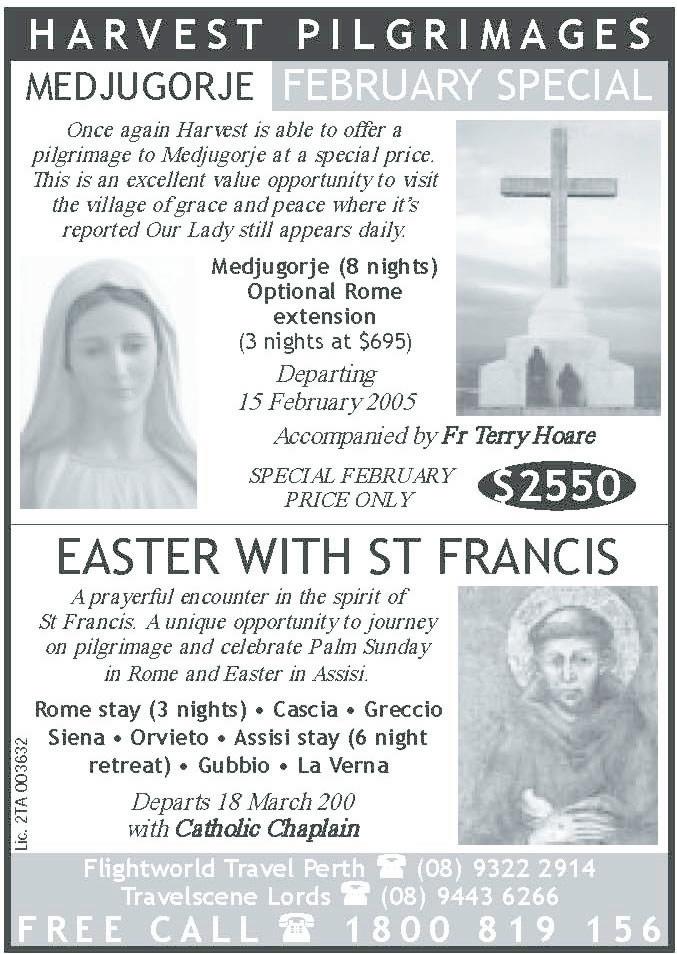
January 27, 2005, The Record Page 3
Perth Caritas Director Anne Fairhead, centre, calculates donations watched by Caritas staff and volunteers.
Participants discuss some of the points raised in the well-attended Theology of the Body seminars organised and run by the archdiocesan Respect Life Office.
Photo: Paul Bui
WIN! Dinner for two “Record” Reader
Survey/Competition
Yes, five dinners for two to be won!

Our new survey is designed to help The Record better understand its readership. Please fill in the form and send it back to The Record, reply-paid, and you will be eligible to win a dinner for two at the Aparacida’s Cafe Emporium
Name .......................................................................................................................
Address........................................................................................................................................ ......... Postcode.............
How many in the household?................
How many in the household read The Record? ............
Please circle your answer
Person 1
Age: 15-24 25-34 35-44 45-54 55+ Gender: Male Female
Reads The Record? Yes No
What most do you like/not like about The Record?
Person 2
Age: 15-24 25-34 35-44 45-54 55+ Gender: Male Female
Reads The Record? Yes No
What most do you like/not like about The Record?
Person 3
Age: 15-24 25-34 35-44 45-54 55+ Gender: Male Female
Reads The Record? Yes No
What most do you like/not like about The Record?
Person 4
Age: 15-24 25-34 35-44 45-54 55+ Gender: Male Female
Reads The Record? Yes No
What most do you like/not like about The Record?
Household income: $10,000-24,000, $25-34,000, $35-44,000, $45-54,000, $55-64,000, $65-74,000 $75,000+
Highest level of education in the household?
Trade High School Degree Post-graduate
Please send your filled-out questionnaire to:
Record Cafe Competition
Reply Paid 75
Leederville WA 6902 (no postage stamp required)
Doctor, family man, sought deeper meaning of life
The following eulogy for paediatrician Paul Carman from St Thomas’s Parish in Claremont was given by Associate Professor John Kinder from the University of Western Australia.
Paul Carman
1950-2005
It is my privilege to speak of Paul and the friendships that grew out of parish and school.
All the Carman children attended primary school at St Thomas: Peter is going into Year 3 this year and Helen is going into Year 7. The older children have gone on to different secondary schools – Iona, Aquinas, John XXIII. I hope that what I say will ring true for friends who met Paul at those schools, although I will be focussing on St Thomas.
My first memories of Paul are from Busy Bees at St Thomas’ School. These were moments for what Paul used to call “male bonding”: after a morning of sweeping sand or clearing gutters, the blokes would stand around with a stubby in one hand, not looking at each other but all looking at something else such as a barbie or a plate of scones, and muttering in a blokish kind of way about this and that.
Busy Bees were occasions for dressing down. Paul was in his element in daggy working clothes, especially the most spectacularly daggy sunhats you ever saw. I was very proud after one Busy Bee when the P & F awarded the prize of “worst dressed father” to me: to beat Paul at that was a real achievement.
Paul and Marg have both been givers at St Thomas. They took an active part in social events, in the P & F, and helping out in many ways. Paul was Chair of the School Board for six years. He oversaw a major Capital Development Program which produced the school buildings as we now know them. He dealt with the political side of the job in an exemplary way: the way he led the Board then has been an example for me, and for others. After one Board meeting he said to me that his job as Chair of the Board was not to concern himself with people’s motivations or philosophies, but to allow and encourage each person to make their best contribution and so get the best result for everyone concerned.
After he finished as Chair of the School Board, he took up the position of Chair of the St Thomas Parish Council, which he held until a couple
of years ago. And during all these 20 years, Paul frequently and freely offered his expertise – as doctor, advisor, handyman – to the staff of the school, the priests of the parish, and to many families in both school and parish.
Paul used to describe himself as a boy of the 1950s. He would say his faith was of the simple type, not too up-to-date or fancy, not given to much intellectualising, but strong and clear, like the principles he lived by.
And yet the simple, strong faith of the 1950s style Catholic was always wrestling with the mysteries of the human condition, asking why.
How many of us have shaken our heads this week and asked why. Paul was someone well acquainted with joy and sadness, with good and evil, and suffering, especially the suffering that most of us find most challenging: the suffering of children. For Paul that was his daily business.
His favourite reading matter was modern history – I remember hearing about Russia before and after the Revolution, Europe between the Wars, and of course post-war Australia. He was always wanting to go deeper, to understand better, to enter more deeply into the story of human struggle, suffering and progress. I never thought he was looking for the solutions to the wickedness and foibles of history, or the perfect theory that would answer all the questions. Paul accepted that life is an open question.
Paul’s faith was not of the kind that seeks easy, glib answers. He saw clearly that often the answers are just not there. Like us today, Paul knew that often reality seems absurd, even contradictory. But I think he saw that reality is not absurd or contradictory, it is mysterious.
We have just finished the season of Christmas. Paul recognised that the birth of that baby had not just changed the course of human history, it gave meaning to the whole human adventure. I think the paediatrician had a special appreciation of the fact that the method God chose to enter human history was through the birth of a baby.
Paul believed in a God who had walked the earth and who is always present in the world, a God who invites us not to tie ourselves in knots looking for tidy answers but to join in the adventure of living, to see the goodness in every person and to make our contribution to the world in our own way to the best of our abilities.
So to you, Marg, I want to say that you and the children have shared Paul with us so much. Now it is our turn: we share your sorrow and your grief, and we share your pride in having known such a good man. We promise you all the support and friendship and love we can in the times ahead.
Page 4 January 27, 2005, The Record
OBITUARY
............................................................................................................................................................................................................
............................................................................................................................................................................................................
............................................................................................................................................................................................................
drawn Monday 28 February 2005 ** Information provided is strictly confidential and will not be used for any other purpose.
Competition
First communions help us all
Vatican official:
Children's first Communion can help whole parish
■ By Cindy Wooden
Children's innocence, openness and ability to be awed mean that, when properly prepared, their first Communion can be a moment when the whole parish witnesses how great a gift the Eucharist is, said Cardinal Dario Castrillon Hoyos.
As soon as children are able to recognise the difference between regular bread and a consecrated host, preparations for their first Communion should begin, said the cardinal, prefect of the Congregation for Clergy.
In a letter posted on January 22 in Spanish, Italian and German on the congregation's Web site - www. clerus.org - the cardinal urged priests, in consultation with their bishops, to ensure that children in their parish are able to receive their first Communion when they reach "the age of reason," generally agreed to be 7 years of age.
In many countries, while Communion preparation classes accept 7-year-olds, many of the children do not receive their first Communion until they are 8 or 9.
Cardinal Castrillon said that in 1910, when Pope Pius X authorised publication of a decree saying that children could receive their first Communion "from about the seventh year," it "marked an important change for the pastoral care of children."
Pope Pius' decree noted that "a few errors" had been made in
determining the "age of reason," so that until 1910 children under the age of 10 - and in some dioceses, under the age of 14 - were prevented from receiving Communion.
Allowing children to receive the Eucharist at a young age "has brought great grace to the Church," Cardinal Castrillon said.
He told priests that Pope John Paul II praised the decision to allow young children to receive Communion.
In his autobiographical book, Rise, Let Us Be on Our Way, Pope John Paul said Pope Pius' decision was "a touching testimony of pastoral love for children."
The future Pope John Paul received his first Communion in May 1929, just after his ninth birthday.
Cardinal Castrillon told priests, "I think that one of the greatest joys for a pastor is to hear the
first confession of children and then let them receive their first Communion."
"The younger they are," he said, the more certain a priest can be that the children "are worthy to receive in their hearts the sacramental Christ."
"In fact, the mind of a child who has reached the age where they begin to reason - and today this age is reached quickly - is open and available to welcoming the divine light that makes the mystery of God's love for man penetrate where it is able," the cardinal wrote.
"Faith raises us beyond reason," he said, "and this faith, which we frequently experience in our parishes, is very alive in children who are able - sometimes more than we are - to express their closeness to the Lord with prayer."
The cardinal did not mention
ongoing discussions in the Church about preparing mentally handicapped children for their first Communion and was not available on January 25 to discuss the question.
Cardinal Castrillon told the priests he hoped the "holy practice" of allowing young children to receive their first confession and first Communion would be better appreciated and followed during the Year of the Eucharist, which runs from October 2004 to October 2005.
The cardinal prayed, "May love for the most holy Eucharist be transmitted from the most tender age and the desire to receive the body of Christ become the surest path for building a future of peace and holiness, not only for the individual, but for the whole Christian community."
- CNS
Clerical celibacy not the issue: Bishop Sproxton
Perth’s Auxiliary Bishop Donald Sproxton has commented on a submission made by an Australian priests association regarding the issue of clerical celibacy.
A report in the Sydney Morning Herald and The West Australian on Wednesday morning revealed comments by the executive of the National Council of Priests in relation to current and potential shortages of priests and the propspect of easing the requirements for celibacy as a means of solving the problems. The comments are contained in the NCP’s submission in preparation for the Synod of Bishops in Rome later this year.
The Synod is primarily about the Eucharist, but the availablility of priests is central to the provision of the Eucharist. The Synod will bring to a close the Year of the Eucharist. Bishop Don Sproxton provided the following comment to The West Australian on Wendesday:
“I have read the submission of the National Council of Priests to the Synod to be held in Rome later this year. I was impressed by the pastoral concern the Council has for the people in the isolated rural areas of Australia.
“Those communities have seen the rapid diminution of their populations and of the services which we in urban communities take for granted. In many dioceses around Australia there has also been a radical decline in vocations to the priesthood since the 1960s. This phenomenon has been experienced by the other churches as well. Consequently, these dioceses are finding it difficult to fill all the parish appointments in those isolated areas.
“The Sunday Mass is very important to Catholics who take part in the life of the Church, so the Council's concern is serious. They suggest that the Synod delegates consider a range of possibilities to address the issue.
“Personally, I am not convinced that celibacy is the issue. Here in Perth we have seen an increase
in the number of students for the priesthood since the re-opening of St. Charles Seminary in Guildford and the creation of Redemptoris Mater Archdiocesan Missionary Seminary in Morley.
“Ordinations from both of our seminaries have given us 56 more priests since 1994.
“However, the National Council of Priest's submission has posed other ways of providing priests
PRINCIPALSHIPS
in the rural communities, such as discerning within a community to elect a local person who might be trained for priestly service in that community.
“The Council's submission
reflects the thinking of many priests around Australia and it will be considered by the representatives of the Australian bishops, along with submissions from other priests and people of the Church.”
Eucharistic Healing and Family Renewal Retreat
by: Rev. Fr. Augustine Mundakatta (Potta), Kerala, India
Good Shepherd Primary School, Kelmscott, is a double stream co-educational school, with an enrolment of 469 students from K-7. The school was established by the Loreto Sisters and is closely linked with the parish of Good Shepherd.
The school has a strong focus on Literacy and Numeracy, as well as providing specialist programs in Music, Wellness and Library. Reading Recovery is the main intervention program. Good Shepherd Primary is well resourced and receives strong support from the School Board and the Parents and Friends’ Association.
Good Shepherd Primary School St Anthony’s School
St Anthony’s School, Greenmount, is a co-educational double stream school, with an enrolment of 510 students from K-7. The school was established in 1957 by the Daughters of Charity and the Salvatorian Fathers also have a strong association.
The school strives to develop the whole child with a strong emphasis on pastoral care. Parental involvement is an essential part of the school life.
Specialist programs include Physical Education, Library, Music, Middle School Transition and Environmental programs. St Anthony’s will be implementing the RAISe program in 2005.
Yidarra
Catholic Primary School
Yidarra Catholic Primary School, Bateman, is a double stream co-educational school, with an enrolment of 560 students from K-7. The school was established in 1985 by the Sisters of Mercy. Yidarra is an integral part of the St Thomas More Parish, Bateman.
The school provides opportunities for students to develop their skills and talents and to experience success in a variety of contexts. Specialist programs include Physical Education, Library, Music, Drama, LOTE (Italian) and Information Technology.
Yidarra enjoys strong community support with parents being actively engaged in the day-to-day life of the school.
The commencement dates for the above positions are negotiable.
Applicants need to be practising Catholics and experienced educators committed to the objectives and ethos of Catholic education.They will have the requisite theological, educational, pastoral and administrative competencies, together with an appropriate four-year minimum tertiary qualification and will have completed Accreditation B or its equivalent.
A current Federal Police Clearance/100 Point Identification Check must also be included. The appropriate Police Clearance Consent Form is available from the Department of Education and Training website (www.eddept.wa.edu.au/ HRRecruitment/Downloads/PoliceClearance.pdf).
The official application form, Referee Assessment forms and instructions can be accessed on the Catholic Education Office website www.ceo.wa.edu.au Enquiries regarding the position should be directed to Helen Brennan, Consultant, Leadership Team on 9212 9268 or email: sch.personnel@ceo.wa.edu.au
All applications, on the official form, should reach The Director, Catholic Education Office of Western Australia, PO Box 198, Leederville 6903 no later than Tuesday 22 February 2005.
South of river: Our Lady of Lourdes, Townsend Road, Rockingham: February 8 and 10, 6.30pm Mass followed by talk
North of river: St Bernadette Church, Leeder Street, Glendalough: Feburary 9, 6.30pm Mass followed by talk
Full day retreat: February 11, 12, 13, Good Shepherd Church, 215 Morley Drive, Lockridge, from 9am.
For further information: Kiran 0423 788 630, Paulose 0403 699 280

Maranatha
Institute for Adult Faith Education
Archdiocese of Perth
Catholic Education Centre 50 Ruislip Street Leederville
Do you want to:- Know more about your faith? Confirm your adult understanding of Catholic belief and practice? Take a guided tour through the Old or the New Testament? Discover the links between self-knowledge/personal growth and prayer. If so Maranatha offers 13 complete Courses in four terms in 2005 Courses are held Tuesday and Friday
TERM 1 COURSES
Begin Tuesday 15 February and Friday 18 February
For: 7 weeks
Cost: $45
Tuesday 9.30am-12pm The Gift of the Eucharist –“Do this in Memory of Me” with Fr Vincent Glynn 1pm – 3pm The Enneagram with Sr Margaret-Anne Beech SJA
Friday 9.30am-12pm Ministry to those who Grieve with Gerry Smith
Enrolments or information phone 9212-9311 Tues. Thurs Fri. 9am-3pm. and we will send you a Course Booklet fax 9212-9382, Email: maranatha@ceo.wa.edu.au
January 27, 2005, The Record Page 5
Canada faces same problem as we do
Christian societies were the first to introduce successful and sustained democracies (the Greeks not excepted) because they possessed the sound moral order that is essential to any society’s normal functioning. Around the world, activists and governments deficient in a serious understanding of what constitutes human ethics, or even just plain ethics, are colliding with churches (mainly the Catholic Church) over moral issues best described as basic. The following editorial “Beware the totalitarian state,” appeared in the December 27 issue of the Western Catholic Reporter, newspaper of the Diocese of Edmonton, Alberta, in Canada.
In an article last March in the journal First Things, Father Raymond de Souza, a priest of the Kingston, Ontario, Archdiocese, argued, “Canada is not a totalitarian state, but the totalitarian impulse is very thinly disguised indeed, and the signs on the horizon are ominous.”
letters to the editor
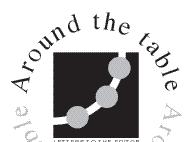

Tradition counts
Ioften see advocates on TV interviews claiming that Christ was never quoted in the gospels as saying anything about homosexual behaviour, as if that is the last word on the subject.
Appropriately related...
In your January 20, 2005 edition, Guy Crouchback bemoans the fact that a satanist sailor has been granted the right to religious expression on a British warship. Guy then asks, without any seeming sense of irony, the rhetorical question, “Gives you a warm feeling, doesn’t it, to consider that someone worshipping the Lord of the Flies, the Prince of Destruction, may be put in charge of thermonuclear weapons?”
On the contrary, in view of the destructive and indiscriminate power of such weapons, I think it most appropriate that satanism and such weapons go hand in hand.
Eamon Murray Ocean Reef
PO Box 75, Leederville, WA 6902
Tel: (08) 9227 7080, Fax: (08) 9227 7087 cathrec@iinet.net.au
Father de Souza saw manifold threats to the freedom of religion in Canada, the federal government’s reference to the Supreme Court on same-sex marriage first among them. Freedom of religion is the basic freedom, not the freedom to make up your own religion, but rather the freedom in conscience to adhere to a set of religious principles. No totalitarian government - a government which aspires to total control over the life of its people - will allow people this freedom. It will attempt to control the sanctuary of religious conscience just as it limits other aspects of human living.
But Canada totalitarian? We have a fine history of democracy and even today we are striving to uphold human rights. How could Canada become totalitarian? Well, just by exerting control over freedom of religion.
The Supreme Court, in its December 9 ruling on same-sex marriage, upheld the right of Churches and clergy to refuse to take part in such marriages. Churches will not be conscripted to take part in this alleged human rights venture. We can rest easily for now - or so we may think.
What is of concern is that the Supreme Court even chose to rule on this question: for the courts and the state have no jurisdiction over the administration of the sacraments. Yet, our courts and politicians boast that they allow the Churches to administer the sacraments and see this as the perfect response to any recalcitrance from Canada’s faith groups regarding the legalisation of same-sex marriage.
Father de Souza raised a number of scenarios in which the political enthusiasm for same-sex marriages may curtail the exercise of religious freedom in Canada short of the government trying to control the administration of a sacrament. Will future court rulings oblige churches to rent out their halls for receptions following same-sex marriages? Will religious charities be forced to recognise people in same-sex relationships as legally married? Will religious schools be barred from firing a teacher who is in a same-sex marriage? Will a religious hierarchy be barred from disciplining clergy who perform legally valid, but ecclesiastically forbidden, same-sex marriages?
We don’t yet know the answers to these questions. But if they seem farfetched, consider some recent incidents. There was the Ontario case in 2002 of a court ruling that a Catholic high school must allow a student to bring his same-sex friend to the school graduation.
Then there was the Revenue Canada phone call to Calgary Bishop Fred Henry demanding that he remove a pastoral letter critical of Prime Minister Paul Martin from his diocese’s Web site or risk losing the diocese’s charitable status. While Bishop Henry criticised Martin, a Catholic, for espousing positions on same-sex marriage and abortion clearly at odds with Church teaching, he did not even suggest how Catholics should vote.
Religious freedom is still alive in Canada. But our country is more and more working out of the assumption that democracy is based on religious and ethical pluralism.
This is a false assumption. What democracy requires is a foundation that some ethical principles are inviolable and that there are limits to the reach of state power. Our Charter of Rights and Freedoms calls it “the supremacy of God and the rule of law.”
Until there is far clearer recognition that ethical goods, such as human life, friendship and religion, are immeasurable and not up for auction, our democracy will be in trouble. Canada is not a totalitarian state. But the march forward of same-sex marriage has placed the future of democracy in doubt. As Father de Souza stated, the signs on the horizon are ominous.
Apart from the fact that he never said anything about wife bashing or the importance of the trains running on time, he must have spoken to his apostles on many occasions during his three year ministry, without all that ministry being recorded in the gospels.
Ignoring the tradition in the Catholic Church, these people talk as if the Church came out of the bible, instead of it being the other way round.
If reminds me of a close and precious relative, who owns a large medical book. She often refers to it and quotes passages out of it, but that doesn’t qualify her to do brain surgery.
A medical doctor learns through a mixture of tradition, lectures and practice. And so the Catholic Church works along similar lines.
Frank Bellet Petrie, Q’land
Gone shopping
This is an urgent matter! In a few weeks time, every Western Australian voter will make a decision, which will be interpreted by our politicians as a mandate.
No, Dr Gallop, this is not just a “women’s issue”!
If the referendum produces a majority ‘Yes’ vote, it will have a significant impact on a wide range of businesses, organisations and, most importantly, families and individuals.
I urge all readers to better inform themselves of the issues and threats, and to ensure their family, friends and work colleagues are able to cast an informed vote on the day.
I believe there has been inadequate attention given to the negative side of this issue.
The question should not be read as “would you like more hours to shop?”
I think the voters of WA would say NO, if they realised the impact this decision would have on the family life of the retail employees who have to work the extended hours.
As an example, ask the sport-
ing associations how it impacted on them over East, when many of their junior coaches and officials could no longer participate because of extended work commitments.
The families of small business proprietors and their staff will also be affected, as many of them will struggle, put off staff, or have to close.
I believe the personal cost of this unnecessary initiative is too high!
Tony Stefanoff Carine
Coogee Beach
Why would the State Government and local council let recently proclaimed Perth’s Best Family beach (by the expert on Coastal Beaches in Australia, Professor Andrew Short of Sydney University) be subject to destruction for the sake of a huge private residential canal marina to be constructed 400 metres out into the open ocean?
Coogee Beach, where WA Department of Education holds daily vacation swimming classes for children in its safe, calm, pristine waters (where dolphins swim while the children are having their classes) never has to have people being rescued from strong rips and currents as regularly occurs at other Perth beaches. Coogee Beach also has a popular recreational jetty, from which people can fish and dive and a wonderful long grassy picnic ground behind the beach. This pristine beach is under threat by the proposed construction of the Port Coogee marina but so many people are feeling powerless to prevent this onslaught.
It seems the media are unable or unwilling to acknowledge that the Premier and the Minister for Planning have admitted “that the proposed marina will have an impact on the coastal processes with the accumulation of sand along the northern breakwater and the reduction of sand flowing to Coogee Beach. However, the flow of sand is proposed to be managed by a sand-bypassing pipeline which is to be installed at the
time of the marina construction.” Having seen the permanent damage to sand flow and water discoloration caused by the building of marinas at West and Glenelg beaches in South Australia, necessitating truckloads of sand having to be carted from one end of the beach to the other every day at the cost of $1.7m per year to the taxpayer, I find it quite frightening that neither the State Government, nor the local council are willing to acknowledge that precious Coogee Beach will be sacrificed. It is obvious that neither body can provide any guarantee that Perth’s Best Family beach will not be damaged.
But more to the point is - what has happened to social justice in this country when the media appear to block critical information getting out to the public?
Marie Slyth West Perth
No mystery
It is hard to understand R Stewart (Record January 20). The Mystery that we were taught from childhood, is the transubstantiation of bread and wine into the Body and Blood of Christ.
Having recently retired from the editorship of the parish News Sheet after nearly forty years (and having worked with six or more priests) the name of the visiting priest was always published, except for unforeseen circumstances.
If relying on a Religious Order - the celebrant usually introduces himself.
While in theory a name card near the entrance has merit, few would look. In these days of the motor car many people arrive just ahead of the entrance procession, with no time to check; besides who would provide the card and who would be responsible for putting it in place?
We should show devotion to God and His Son during the Holy Sacrifice, and arrive ten or fifteen minutes before starting time; being able to read the News Sheet and pray.
Patrick Brophy Mount Lawley
perspectives Page 6 January 27, 2005, The Record
editorial
guest
The Parish, The Nation, The World
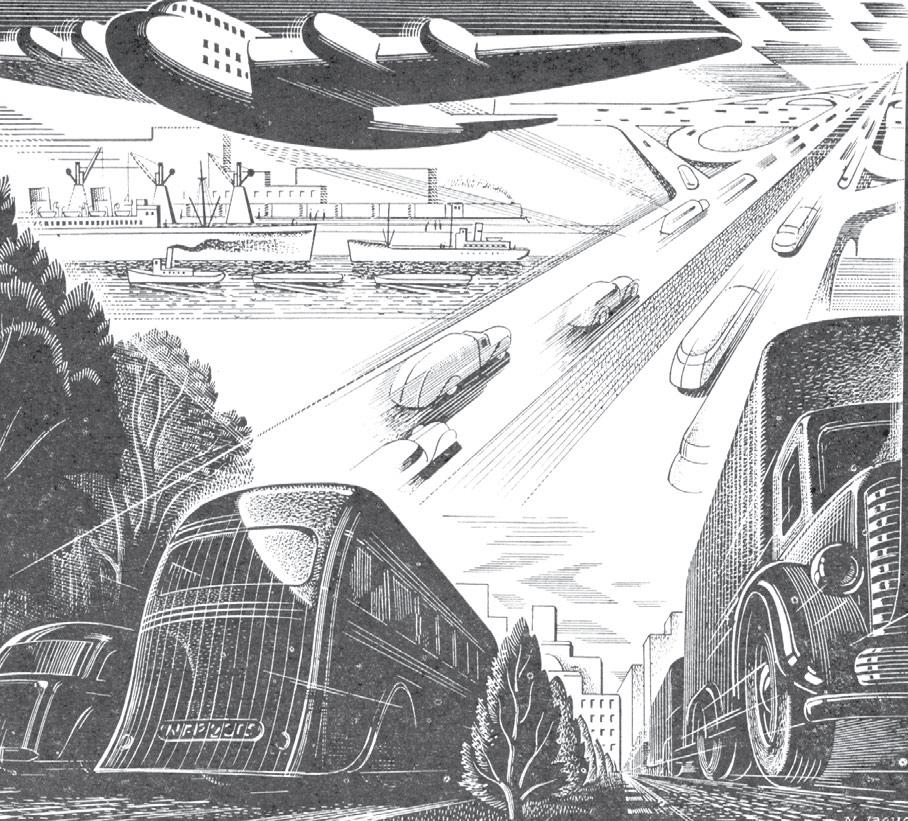
Laying the groundwork for…
The Moral Economy
Economic theories come and go. While the Church does not back any one theory over another, it regards the philosophical and moral issues of how economies and societies should operate justly as being very important. For the Church the economy exists to serve the individual and society, not vice versa. Here, the Romebased Zenit news agency, which reports on Vatican and Church news, looks at what the new Compendium of Catholic social teaching, released in October last year, has to say.
The new Compendium of the Social Doctrine of the Church dedicates a special chapter to look at economic activity in general. Like other chapters, it starts with an overview of some biblical principles.
In the Old Testament, riches are seen as a blessing from God. Abundance is not seen as a problem in itself, but there is strong condemnation for the misuse of material goods - fraud, usury, injustice - especially when it is the poor who suffer these abuses.
The other side of the coin, poverty, is seen as part of the human condition. In this context the Old Testament calls upon people to recognise their poverty before God. He, in turn, is portrayed as answering the cries of the poor, who will receive their reward through a new David. “Poverty takes on the status of a moral value when it becomes an attitude of humble availability and openness to God, of trust in him” (No. 324).
In the New Testament, Jesus calls for a conversion of hearts and to be attentive to the needs of others. Working for justice and helping the poor is one way of building the Kingdom of God.
In general, the Bible considers economic activity as part of the vocation in which mankind is called upon to administer the gifts received from God. The parable of the talents also teaches that “what has been received should be used properly, preserved and increased” (No. 326).
Sharing riches
Material goods, even when they are the legitimate property of someone, retain their universal destination. “Riches fulfill their function of service to man when they are destined to produce benefits for others and for society” (No. 329).
This nexus between morality and economic life is a constant in Church doctrine. “Just as in the area of morality one must take the reasons and requirements of the economy into account, so too in the area of the economy one must be open to the demands of morality” (No. 331).
The Compendium suggests that morality and economic principles do have some points in common. For example, producing goods in an efficient manner can be seen as a moral duty, in the sense that not to do so would be a waste of resources. But the production of wealth also needs a moral orientation, in order to ensure that economic growth is distributed equitably and is guided by principles such as justice and charity.
Economic activity carried out in this way becomes an opportunity to practice solidarity and to build a more equitable society and a more humane world. The Church also considers that terms such as development cannot be seen merely in an economic dimension, as just accumulating goods. An exclusive concentration on the material aspect risks falling into the error of consumerism and is not the way to achieve authentic happiness.
Private initiative
A section of the chapter on the economy spells out the position of Church social doctrine regarding private initiative and business activity. The freedom of people to engage in economic activity is “a fundamental value and an inalienable right to be promoted and defended” (No. 336).
Initiative in the economy is part of human creative activity and businesses also have an important social role to play through producing goods and services. While this role needs to be carried out according to economic criteria, the Compendium adds: “the authentic values that bring about the concrete development of the person and society must not be neglected” (No. 338).
In this context the Compendium recalls that the Church has long supported family and small- to medium-sized businesses, along with cooperative activities, which can make a valuable contribution to economic and human life. In fact, economic activity provides an opportunity for the practice of many virtues, such as diligence, prudence, fidelity and courage.
The text also has positive words for the role of making profits, which are a sign that the productive factors involved in the enterprise are being used well. However, businesses must also serve society properly and this is not done when the obligations of social justice or the rights of workers are violated.
The Compendium also notes that in today’s world individual states can find it difficult to govern the operations of businesses and that this places on private enterprise a greater responsibility to be open to the values of solidarity and authentic human development.
Serving people
On the matter of the free market in general the Compendium explains that it “is an institution of social importance because of its capacity to guarantee effective results in the production of goods and services” (No. 347). A truly competitive market, continues the text, “is an effective instrument for obtaining important objectives of justice.”
Nevertheless, the Compendium adds that the ends of the common good and human development must also be taken into account in a free market, and not just the profit motive. There are important human needs and goods that cannot be bought and sold in the marketplace.
Regarding the role of the state in regulating the market the Compendium invokes the application of two principles: solidarity and subsidiarity. Solidarity is to stimulate actions to defend the weak and disadvantaged; subsidiarity is to guarantee that the state’s intervention will not become overly invasive.
Over several numbers the Compendium insists that the state must not interfere too much in the workings of the economy, thereby unduly restricting the liberties of individuals and businesses.
On the other hand, it also defends the legitimate role of taxes and public spending, which play an important role, especially in protecting the weak. Therefore, paying taxes is “part of the duty of solidarity” (No. 355), but the state has the corresponding obligation to ensure that taxes are “reasonable and fair,” and that public resources are administered with “precision and integrity.”
Vista THURSDAY, JANUARY 27, 2005 soon to be on the Web Perth, Western Australia

Global dimension
The last part of the chapter considers some of the recent developments related to globalisation and international financial markets. “Globalisation gives rise to new hopes while at the same time it poses troubling questions” (No. 362).
The Compendium recognises that globalisation has opened up many opportunities, but expresses concern over the inequalities between advanced economies and developing countries. Citing John Paul II the text calls for a “globalisation in solidarity” to deal with this problem.
A more equitable system of international commerce, and a strong defence of human rights are among the reforms called for by the Compendium Respecting cultural and religious differences and ensuring a greater solidarity between generations are other points dealt with.
Regarding financial markets, the text acknowledges their positive role in facilitating economic growth and large-scale investments. However, there is a risk that the financial sector will lose sight of serving human development and will become “an end unto itself.” And faced with the severe problems caused by financial instability, there is also a need to make these markets more stable.
Globalisation also requires greater cooperation by states to coordinate the economy, given that individual governments are often no longer able to exercise effective guidance. The Compendium calls for the creation of “adequate and effective political and juridical instruments” (No. 371) that will ensure “the common good of the human family.”
Renewing its call for solidarity, one of the concluding numbers observes that achieving this will also bring benefits for richer countries, where the abundance of material goods is often accompanied by “A sense of alienation and loss of their own humanity” (No. 374). The chapter concludes by calling for educating people so they will realise that economic activity must be seen in the wider human context.
overcome poverty.



The hefty, 3,000-page document is the work of the UN Millennium Project, which was commissioned to develop a global plan for achieving the Millennium Development Goals by 2015.
The MDGs are a series of targets for reducing poverty, hunger, disease and lack of infrastructure. The report, “Investing in Development: A Practical Plan to Achieve the Millennium Development Goals,” was produced by a team of more than 250 experts, under the direction of Harvard professor Jeffrey Sachs.





a massive replenishment of soil nutrients for smallholder farmers on lands with nutrient-depleted soils, through free or subsidised distribution of chemical fertilisers and agroforestry, by no later than the end of 2006.
training large numbers of community-based workers to ensure adequate expertise in health, education, agriculture, nutrition, infrastructure, water supply and sanitation, and environmental management.
The morality imbalance Putting it into practice
Under UN auspices, experts have been looking at how affluent First World nations can shoulder their responsibility to help those whose lives are bound by poverty and disease in the developing world. The experts have come up with some innovative solutions, reports Zenit.
UN Secretary-General Kofi Annan told a news conference that the report would enable world leaders to “engage in very serious in-depth discussions on some of the most important issues and dilemmas facing the international community,” while they prepare for a UN summit on development in September. Annan said he hoped the meeting would produce “bold and far-reaching decisions” and all could “work together to put in place the building blocks for a safer, more prosperous world.”
Quick winners?
The report called upon wealthy countries to increase aid for development, from 0.25% of their gross national product (the 2003 level) to around 0.44% in 2006 and then rising to the 0.7% target by 2015. It also renewed the plea for debt relief and called for “strengthening governance, promoting human rights, engaging civil society, and promoting the private sector.”
One of the most innovative elements in the report is what it calls “Quick Win actions,” designed to rapidly save and improve millions of lives and to promote economic growth. Among the measures proposed under this heading are:
■ free mass distribution of malaria bed-nets and effective anti-malaria medicines for all children in regions at risk, by the end of 2007.
■ ending user fees for primary schools and essential health services, no later than the end of 2006. Increased donor aid would compensate for these fees, as necessary.
■ successful completion of the “3-by-5” campaign to bring 3 million AIDS patients in developing countries onto anti-retroviral treatment by the end of 2005.
■ expansion of school meal programs to cover all children in hunger hot-spots, by no later than the end of 2006. The programs would use locally produced foods.
Among other recommendations the report called upon high-income nations to open their markets to developing country exports and to help increase export competitiveness through investments in traderelated infrastructure such as electricity, roads and ports.
It also made an appeal to international donors to mobilise support for an increase in scientific research and development that will address the special needs of the poor in areas of health, agriculture, natural resource and environmental management.
What is at stake
“How will the world look in 2015 if the Goals are achieved?” asked the report. Fulfilling them would mean lifting more than 500 million people out of extreme poverty. As well, more than 300 million would no longer suffer from hunger. Child health would also dramatically improve, saving the lives of more than 30 million children under 5 years of age.
The MDGs also call for providing safe drinking water for 350 million people and ensuring basic sanitation for 650 million. Hundreds of millions more women and girls will also be able to attend school, and enjoy greater economic and political opportunities.
The report did admit that many countries are on track to achieve at least some of the goals by 2015. Worldwide, between 1990 and 2002 average overall incomes increased by about 21%, and the number of people in extreme poverty declined by an estimated 130 million. Moreover, child mortality rates have fallen and an additional 8% of the developing world’s people received access to water, with 15% also achieving access to improved sanitation services.
Sub-Saharan Africa, however, is another story. The region is in a dramatic situation, “in a downward spiral of AIDS, resurgent malaria, falling food output per person, deteriorating shelter conditions, and environmental degradation.” An infant born today in this region has only a one-third chance of reaching 65 years of age, the report stated.
According to the report, there is no single factor explaining the success or failure of the MDGs. It does, however, list four reasons that explain why the goals are not being achieved:
■ poor governance, marked by corruption, poor economic policy choices, and denial of human rights.
■ a poverty trap, with local and national economies too poor to make the needed investments.
■ uneven progress, as one part of a country advances, while elsewhere pockets of poverty persist.
■ areas of specific policy neglect that can have a monumental effect on citisens’ well-being, even when overall governance is adequate.
Security and stability
The report also argued that the MDGs are not only important from the viewpoint of ensuring greater global justice and human rights, but that, “they are also vital to international and national security and stability.”
“Poor and hungry societies are much more likely than high-income societies to fall into conflict over scarce vital resources, such as watering holes and arable land and over scarce natural resources, such as oil, diamonds and timber.” The report added that in recent years many world leaders have stressed “the powerful relationship between poverty reduction and global security.”
In the current issue of the magazine Developments, No. 28, published by the British government’s Department for International Development, Jeffrey Sachs, the Harvard professor overseeing the UN Millennium Project’s report, explained some of the reasoning behind the MDGs.
“Right now the rich countries are handling emergencies in Africa every year but we are not solving the problem,” Sachs wrote. He added that by concentrating so much on food aid or emergency relief, the underlying problems remain unsolved.
“On the other hand if we helped Africa to invest strongly in improving agricultural activity, in public health institutions for prevention and treatment of disease, for environmental management - then these emergencies would be abated.”
Sachs also argued that there is no single remedy. “Development will depend on trade and aid and dropping the debt,” he wrote. “It is not trade versus aid, it is not trade alone or aid alone.”
The reports’ recommendations have not gone unchallenged. One of the coordinators behind the report, Nancy Birdsall, was quoted in last Tuesday’s New York Times as saying she was worried that there was not sufficient emphasis on “the many difficult steps that poor countries will have to take that have nothing to do with money.” Birdsall was also critical of the multiple priorities in the report and said there were too many “quick wins.”
And in Wednesday’s Financial Times, commentator Martin Wolf said that based on his prior experience in the World Bank he doubted that the substantial changes called for could be achieved in such a short time.
Changing the ways governments are organised, training large numbers of people and building economic infrastructure are tasks that take time, Wolf argued. “A careful buildup that generates sustained improvements would be vastly better than a dramatic expansion that ends up in chaos and disappointment.”
A healthy debate over how to help developing nations will help clarify matters, so long as the wealthy nations pass from theory to putting into practice concrete actions. - Zenit

Page 8 January 27, 2005 The Record January 27, 2005, The Record Page 9
early January an advisory group handed in a report to UN officials on how to help developing nations
In
Once a great newspaper...
 ■ With Guy Crouchback
■ With Guy Crouchback
The Sydney Morning Herald began a recent story as follows: “Dear inmate, I am the brother of the prisoner in the cell opposite you - a holy man wrongly jailed and now forced to sell his only hope of freedom, a magic carpet, to pay for surgery to save our mother’s life. For just six cartons of cigarettes...’
“Dangle a spare invisible key in the deal and ****** ****** may be interested.”
What’s this about? It is a tale of almost incredible stupidity and gullibility. The story goes on to allege that the person named, a financial manager of all people, squandered his clients’ money by recklessly investing in a Nigerian e-mail scam.
It was a scam of the type that has been going round for years and should not deceive a child, although this originally happened three years ago when they were a little less well-known - a pious Nigerian gentleman, the Rev. Sam Kukah, wanted to get US$65 million out of the country and would deposit it in the victim’s bank account for a fat commission, if he could have a little up-front cash to smooth things over.
The financial advisor was not the first person to be taken in by this scam, childish and obvious as it was - so have many intelligent and sometimes highly-qualified people all over the world.
Some have simply had their bank-accounts cleaned out. Some have gone to Nigeria to see what happened to the money they sent and have not been seen since.
In this case it is alleged that more than a million dollars was lost. He has been barred for life from the financial services industry, and at the age of 58 faces a long prison sentence. He has pleaded guilty to obtaining a financial advantage by deception.
I don’t necessarily disagree with the legal processes - I make it a rule not to comment on the human aspect of any court cases unless (and generally even if) I have personal knowledge of the matter, apart from observing that in this case the circumstances were so bizarre that it seems to me possible some medical explanation may be involved.
What does strike me, however, is that this is a basically tragic situation.
A lot of people have lost money which many of them could likely ill-afford, and the financial advisor has paid for his gullibility, greed, or whatever it was with a ruined life. Contemplate what a prison sentence at the age of 58 means in the long term.
But the striking thing here, apart from the whole oddity of the case - reminding us forcibly that there’s nowt so queer as folk - is The Sydney Morning Herald’s introduction to the story - a piece of cheap, smart, flippant and completely callous lowmindedness.
The author treats a small, almost incomprehensible, human tragedy, involving real people, as the starting-point for self-indulgent witticism, as entertainment. This sort of thing morally corrupts, coarsens and deadens us all. It is surely incumbent upon us to speak out against the lowering and coarsening of our culture.
The Sydney Morning Herald was long regarded as one of the best newspapers in Australia. It now seems - this story is by no means the only or even the major piece of its recent journalism that provokes this observation - one of the worst. It is a sad illustration of how a great institution can go.
the family is the future
The future depends on our recognition of family faith




 ■ With Derek Boylen
■ With Derek Boylen
In the foreword of Christopher West’s book, The Meaning of Sex and Marriage, the Archbishop of Denver, Charles Chaput OFM Cap., makes the acute observation that the future of the Church and vocations depends largely on the strength of Catholic families. The family is arguably the most important social unit for the life and future of the Church.
The family has primary influence on how we grow and develop. In the context of the family we take our first steps.
It is where we fall down for the first time and our families teach us what it means to be cared for and nurtured. They share our tears and celebrate our joys. It is in the family that we learn the difference between right and wrong.
Families teach us the meaning of forgiveness. In the Christian family a person also learns the importance of prayer, social justice, how we celebrate life through liturgy and the meaning of the Gospel message.
Throughout the course of human history mankind has come up with plenty of models for being community. We have cities and towns, organisations and corporations, parishes and dioceses. But the first and most natural form of community that God chooses for every person to experience is the family. Through Jesus he endorses its value by making the family the way in which he would enter life with us.
The quality of our family life will be one of the strongest influences on the future of the Church and the world.
As a father of three young sons
I frequently grapple with the best way to help them develop into healthy faith-filled men living out the gospel. How do you share your faith with a toddler?
It’s challenging and it’s easy to decide not to worry. I am a firm believer, though, that faith starts in the home. And hopefully will end in our children’s homes. So where to start?
I guess the best answer is to simply start. I remember quite vividly my father returning home from work and announcing that we would pray together every morning before he went to work.
personal prayer thanking God for something that had happened during the day.
I thank the Holy Spirit for my father’s insight. I hated getting up early in the morning, and prayer can be a real pain in the neck when you want to watch your favourite television programme, however, I am sure that I wonot have the faith I do today if I’d grown up without putting aside those two times a day to speak with God.
The future of Catholicism depends on us as a Church recognising our children and fami-

To make things worse he also decided that we would pray at night before my youngest brother went to bed. Those troublesome Redemptorists had recently conducted a parish mission and clearly my Dad had been paying attention!
Our prayers were always very simple. In the morning we would say the first verse of the hymn “One Day at a Time Dear Jesus” and then go around and say a personal prayer for our day. In the evenings we would say an Our Father, Hail Mary and a
lies as the gift they are to the future of our faith. Whether you are a parent, grandparent, uncle or aunt or someone who sits next to a family at Mass each Sunday, I hope that the suggestions put forward in subsequent columns might inspire you. Children can, at times, be frustrating but as Christ says “Suffer the little children to come unto me.”
Having said that, it’s not all suffering, there are many joy-filled, happy and humorous moments too. I hope to share a few of ours with you along the way.
Challenges of Church and world, as seen by cardinals
A book of interviews surprises its author
After interviewing 111 of the cardinals who could vote for a new pope in a conclave, the Vatican correspondent for Italian Radio and Television had words of praise.
“The cardinals are a monument to John Paul II’s greatness,” said RAI journalist Giuseppe De Carli.
“Country by country, continent by continent, we have realised that the cardinals are as great as the Pope,” he said. “This is the amazing discovery we have made.”
De Carli and his team still aim to interview nine more elector-cardinals. In an interview with ZENIT, De Carli says that he hopes to soon complete these interviews.
The Vatican-watcher has just published a selection of 23 interviews in a book entitled Allow Me, Eminence (‘Eminenza, Mi Permette?’, published by Piemme, RAI-Eri), which begins with Cardinal Joseph Ratzinger, prefect of the Congregation for the Doctrine of the Faith, and ends with Cardinal Telesphore Placidus Toppo, Archbishop of Ranchi, India.
Other cardinals interviewed in the book, subtitled ‘The Church and the World According to Pope Wojtyla’s Cardinals,’ are Julián Herranz of Spain; Walter Kasper of Germany; Renato Martino, Angelo Scola and Dionigi Tettamanzi, of Italy; Philippe Barbarin of France; Kevin O’Brien of Scotland; Anthony Olubunmi Okogie of Nigeria;
Claudio Hummes of Brazil; Justin Rigali of the United States; and Ivan Dias of India.
In order to explain what he discovered in these interviews, the book’s author says that the cardinals “not only have a most intense bond with the Successor of Peter, but are also similar to him.”
De Carli explains: “The Pope’s was an adult vocation; at least half of the cardinals had adult vocations: There are former trade unionists, economists, lawyers. Some are even converts, such as Cardinal Jean-Marie Lustiger, Archbishop of Paris, who was a Jew, or Cardinal Julius Riyadi Darmaatmadja, Archbishop of Jakarta, who was a Muslim.”
“They are people who love life, who engaged or engage in sports,
as this Pope: in baseball, rugby, soccer, athletics. Some almost made it to the Olympics and one of them represented his country on the basketball team,” De Carli said.
“These elements should banish from us the image of the aloof cardinal, a man of power,” he added. “They are men who are completely rooted in our time.”
Asked about the difficulty of interviewing them, De Carli revealed his strategy: “I started with the one I thought was most difficult, Cardinal Ratzinger. I said to myself: ‘If he accepts, it is possible that all the others will accept.’ After a week, he said yes, though I had to insist a bit. He granted me 40 minutes, and it was a wonderful interview.
“When I showed my friends
the recordings, one of them said: ‘Why don’t you transcribe them? They are such lofty, open, critical and self-critical reflections, that it would be opportune to gather them in a book.’ This is the idea: to go to the source. Not to write a book about the cardinals, or this Pope’s possible successor, which I could care less about.”
“I wanted to go to the source to try to understand how these cardinals live the Gospel,” De Carli said.
According to the interviewer, the cardinals have three concerns in common.
Page 10 January 27, 2005, The Record
i say, i say
Continued on page 11
‘Yes, I am a Catholic’
British cabinet minister hounded by media to speak on her spirituality
A Blair Labor Government Minister in the UK has found that her spirituality and Catholicism have made her a target for political criticism.
The case was also unintentionally misreported in Australia by CathNews, the daily news website of the Australian Catholic Bishops, which reported that “Faced with criticism that her alleged membership of Opus Dei and her Catholic faith could influence her professional life, the UK's new education secretary Ruth Kelly has declared her primary allegiance to government policy rather than Church teaching.”
However, highlighting the importance of her faith in her life Mrs Kelly, a mother of four, had not chosen government policy over Catholic teaching.
"I am absolutely clear that as a member of this government I have collective responsibility for government policy, so as a member of the cabinet responsible for education, I also have responsibility for those policies developed in the health department and in the international development department and so forth, and I stand by those," she told
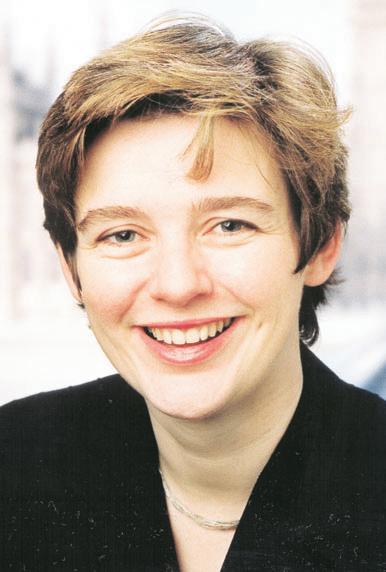
the BBC. "While there are issues of conscience, which of course I'll express my view on in the lobby in the usual way - because most of these are questions of free votes - as a member of the government I have responsibility for those policies and for implementing them in my own department."
Refusing to say whether or not she is a member, Ms Kelly said she had received "spiritual support" from Opus Dei.
Following speculation that the newest member of Prime Minister Tony Blair's cabinet had ruled
out a move to the departments of health or international development because of her opposition to abortion and contraception, she said that her faith would not stand in the way of her taking up further government jobs.
The 36-year-old mother of four said her faith is a private matter.
"I, along with any other politician, am entitled to a degree of privacy in my private life," she said. "I do have a private spiritual life and I am completely open about that. People know that I am a Catholic and that I take it seriously.
In his syndicated column, papal biographer George Weigel describes Kelly as a "sign of contradiction for Britain's secular left".
He commented: "British conspiracy theorists are in a lather because Ruth Kelly has participated in activities organised by Opus Dei.”
“What really earned Ruth Kelly the Buttiglione Treatment, though, is the fact that she's a mythbreaker: day by day, her public life refutes the canard that serious public Catholicism in the 21st century means incipient fascism. For who could plausibly accuse this bright and accomplished trade union member of being - gasp! - one of those dreaded conservatives? Conservatives and former Guardian writers don't get elected Labor MP for Bolton West."
'Rethink euthanasia'
Pope urges Netherlands to rethink its position after doctors reveal they have killed 22 terminally ill babies
■ By Cindy Wooden
Pope John Paul II asked the people of the Netherlands to re-think the direction their country is taking on abortion and euthanasia and return to guaranteeing the right to life of each of its citizens.
The Pope made the request welcoming Monique Frank, the new Dutch ambassador to the Holy See following reports that senior Dutch doctors had admitted killing 22 terminally ill newborn babies.
The Pope framed his comments in praise for the Netherlands' commitment to promoting peace, development and human rights around the world.
"For several years, Dutch society, marked by the phenomenon of secularization, has been engaged in a new politics in matters of legislation concerning the beginning and the end of human life," the Pope said on January 22.
The Pope said the Holy See cannot hesitate in making known its clear position and called on Catholics in the Netherlands to give witness to their attachment to absolute respect for the human person from conception to natural death. "I urge authorities and medical personnel, as well as all those who exercise a role in education, to recognise the seriousness of these
questions,” the Pope said, urging the Netherlands “To make choices that would ensure the country is "more attentive to the person and his dignity."
A study published the same day in the Dutch Journal of Medicine said that at least 22 newborn babies had been put to death since 1997, based on the doctors´ own reports to public prosecutors. The true number is believed to be far higher.
The author of the report, Dr Eduard Verhagen, who is Head of Paediatrics at Groningen University Hospital, said that doctors put to death between 10 and 15 infants a year.
No action was taken over any of the deaths, although euthanasia is technically legal in Holland only for patients aged over 12.
In 2001 the Netherlands became the first country to legalise euthanasia for adults suffering unbearable incurable pain
Verhagen is also head of the Children’s clinic at the Groningen Academic Hospital, which last year caused outrage at the Vatican and among euthanasia opponents by proposing guidelines for child euthanasia and announcing that it had already used them to kill four newborns.
The Groningen Protocol, as his guidelines have come to be known, say euthanasia is acceptable when the child’s medical team and independent doctors agree the pain cannot be eased and there is no prospect for improvement, and when parents think it’s best.
The 22 babies listed in the study suffered from extreme spina bifida
Hindus smash crucifix
Militants order Carmelite nuns out of convent
A group of intruders described as "miscreants" have broken a crucifix and ordered a community of Carmelite nuns to vacate their convent near Mumbai in India.
"It was around 2:00 am on Sunday when a group of miscreants barged into the convent compound and pulled down a four-feet tall holy red cross and smashed it", Sister Diana, superior of the convent of the Congregation of Teresian Carmelites told SAR News yesterday.
"Our shell-shocked sisters heard the noise and were watching the movement of the miscreants from behind the closed doors for fear of life. This is the first time we have received such threats. We are all still heart broken really", she said. "We do not know who the criminals are except that they claimed to belong to a Hindu group", she added.
With three nuns and two candidates, the Teresian Carmelite Convent has run a home for 12
elderly women since 2001. Sister Diana, 40, who is also Mumbai archdiocesan coordinator for the Prison Ministry said the miscreants also left handwritten pamphlets in English and Marathi language ordering the nuns to leave the place.
"We are not scared as we have dedicated our lives for the service of the poor and needy", he said.
The pamphlets recovered by the nuns read, "Now it is the Cross, next time it will be your heads", "Run away, otherwise we will not spare you".
Condemning the unwarranted attack, Dolphy D’Souza, vice president of All India Catholic Union and spokesperson of Bombay Catholic Sabha in a statement later on Sunday demanded that the police arrest the criminals immediately to restore the confidence of the Christian minority community.
He said Christians in the city are a law abiding and peace loving community and the "intimidation and terror tactic" of the Hindu group against the nuns would not be tolerated. - CathNews
Fr Paul Baczynski
Fr Paul Baczynski is showing signs of improvement, according to Auxiliary Bishop Don Sproxton. At the time The Record was going to press, the infection was still present and Fr Baczynski continued to be sedated. Tubes to help him breathe were removed
on Wednesday allowing him to breathe on his own. At this stage there is no information on how long Fr Baczynski will remain under sedation. Bishop Sproxton encouraged the Perth Archdiocese to continue prayers for Fr Baczynski’s condition.
Cardinals surprise
in which their spinal cord was open at birth and much of their brains were missing.
Also, their kidneys, bladders and digestive systems did not function.
Dr Verhagen said that such infants "would need at least 60 operations in a year temporarily to alleviate their problems.
These operations would not ease the pain; the child would have to be constantly anaesthetised."
He said that when parents and doctors agreed in such cases that there was no hope of any quality of life, the life of the child should be ended.
In addition to his encouragements to the ambassador, the Pope did not forget to praise efforts by the Dutch government and nongovernmental organizations to fight hunger and poverty in the world and provide medical assistance to those suffering from AIDS, particularly in Africa
"As you know, in order to combat this disease in a responsible manner, the Holy See considers it necessary first of all to increase prevention, especially through education in respect for the sacred value of life and formation in the correct practice of sexuality, which requires chastity and fidelity," the Pope said.
Pope John Paul told the ambassador that, at his request, the Vatican has established the Good Samaritan Foundation to assist AIDS sufferers without access to treatment, and the Catholic Church continues to lobby for greater access to generic drugs for all those suffering from the disease.
- CNS/Cathnews


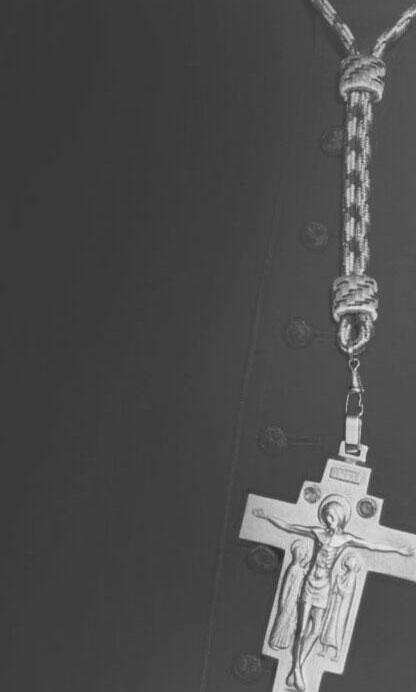
There are 121 Cardinals eligible to elect a new Pope. This CNS graphic was last updated in November, bt Cardinal Jan Schotte died last week.
Continued from page 10
“The first topic is war and peace,” he said. “The line indicated by this Pope is the line embraced by 100% of the cardinals. The Church is the sacrament of peace for the world. The strength of this papacy is the strength of its prophecy for peace. Because of this, John Paul II is regarded as a ‘father’ by Muslims.
“Darmaatmadja, cardinal of Indonesia, the country with the largest number of Muslims in the world, told me that when the war broke out in Iraq, he was very worried because there were fundamentalists who said: ‘As it is a war of Christians against Muslims,
we are going to do away with the Christians, who are a small minority.’
“The cardinal succeeded in gathering a delegation, together with Muslims, and explained to me: ‘We did not go to the World Council of Churches in Geneva. We went to Rome because the Pope is seen as a ‘father’ of all peoples.’”
De Carli continued: “The second great concern is that of relations with Islam. It is a rather complicated topic, which cardinals such as Scola speak about, who says that attention must be paid to Europe’s Muslims, who are already some 18 million. France’s Lustiger and Barbarin also speak about this, as does Tettamanzi, who says that he is not afraid of Islam.”
“Another subject is the crisis of faith. However, rather than a crisis of faith, I would speak about a crisis of religious practice,” the journalist said. “There are Churches in Europe, such as the Church in the Netherlands, where one can speak of the ‘euthanasia’ of a Church. It is disappearing.
“While the Protestant world has become pagan, the risk of the Catholic Church is that it become ‘Protestant,’ that is, that it be divided. In listening to the great archbishops, one has the impression that the world lives as if the Church did not exist.”
“Meanwhile,” De Carli added, “in Africa and Asia, where it is often persecuted and a minority, the Church is expanding. Where the Church is a Church of martyrs, it is also seed for all of us.”
Page 11 January 27, 2005, The Record
Ruth Kelly
- ZENIT
THE WORLD
Iraqi Christians fear the future
Despite reassurances, minority Christians in Iraq are afraid
■ By Carol Glatz
Each time a church in Iraq is attacked or a religious figure is threatened or kidnapped, most church leaders there quickly explain that the incident does not signal an assault against Christianity.
But Christians in Iraq are afraid.
As a tiny minority in an overwhelmingly Muslim nation, Christians enjoyed relative religious freedom under former President Saddam Hussein’s otherwise oppressive, though secular, rule.
The US-led embargo, then war and occupation of Iraq that toppled Saddam’s dictatorship brought further hardship to the people there. Damaged infrastructure and the reigning chaos have altered life for everyone.
“Christians live like all people in Iraq, they have the same worries,” said the apostolic nuncio to Iraq, Archbishop Fernando Filoni.
“But given these attacks, Christians are even more worried; it’s understandable the Church finds itself in double the difficulty,” he told reporters in Rome on January 18 between meetings with Vatican officials.
The added difficulty comes when certain fundamentalist groups see the Church as a symbol or reflection of the Western world or when they assume church members are collaborators with the US-led occupying forces.
Syrian-rite Archbishop Basile Georges
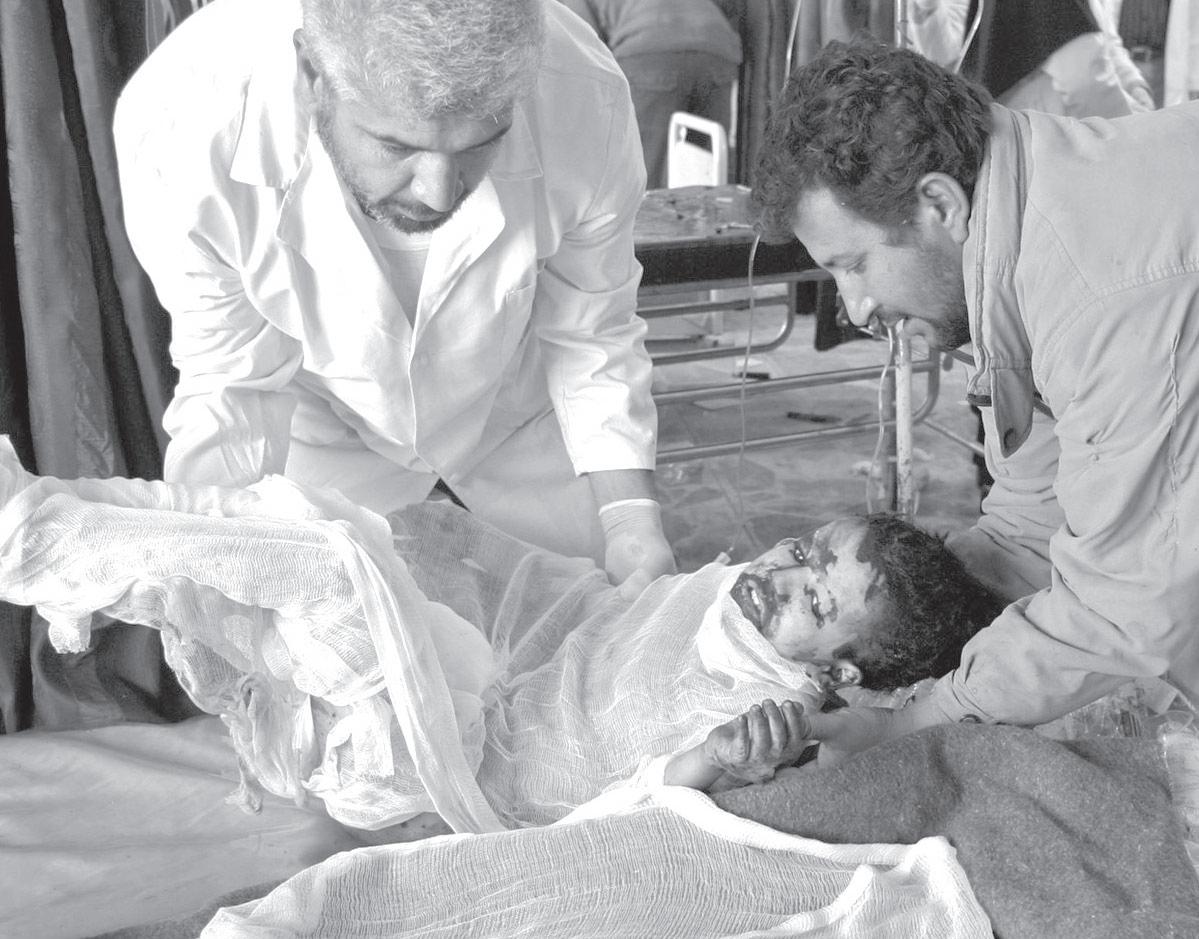
Casmoussa of Mosul, Iraq said that Christians feel unsafe because “the US soldiers deployed in various parts of the country, and whom the local inhabitants see as occupants, have helped create a negative image of Christianity among people of other faiths.”
But confusing the Church in Iraq as being an arm of the West “is very offensive, especially to the Chaldeans,” said Mgr Robert L. Stern, secretary-general of the
Catholic Near East Welfare Association. Chaldean Catholics, who make up the majority of Iraq’s Christians, “resent the idea they are being identified as Western because they are original inhabitants” in Iraq, dating back to “before the time of Mohammed and the coming of Islam,” Mgr Stern said.
But not everyone interprets the violence against Christians and their churches as being just part of the general chaos or as
Catholic uni online in China
Benedictine University has been a strong presence in Lisle for more than 100 years, and now the institution is making inroads in China.
In December, the university started its first courses for Chinese students pursuing a master of business administration degree at Shenyang University of Technology. John Cicero, dean of Benedictine’s College of Business, said there are plans to start students in the master of science in management information systems degree program during the summer at Shenyang Jianzhu University.
Visas to study in the United States would be hard for many of the Chinese students to obtain, and the cost of attending classes at Benedictine University would be about five times the amount needed to earn an advanced degree from a Chinese institution, so the Lisle university plans to bring the classes to the students in Shenyang, a city of about 4.8 million people in northeast China.
Cicero explained the Chinese universities would be providing facilities and support for
Benedictine University receives permission to teach students in China
the Benedictine program - the only American one approved in northeast China.
Benedictine University faculty members have designed the programs and plan on teaching the courses along with the assistance of a few Chinese professors.
The North Central Association and the Chinese Central Board of Education have accredited the programs. The excitement is high on both ends of the partnerships, added Cicero. There is a waiting list of more than a dozen Benedictine professors ready to teach the American courses overseas.
There are 32 English-speaking students enrolled in the first class and they are expected to receive their Benedictine University degrees in June 2006.
“Benedictine University is an institution that sees no boundaries,” said William Carroll, its president.
For more than a decade, Benedictine University has been hosting a handful of Japanese
students from Chuo University who are studying in America as part of an exchange program. The Lisle university, which has an enrolment of more than 3,000 students, is now exploring options with institutions in such countries as Greece, France and Spain and also looking into offering US students more online programs and opening new sites.
“International education is just part of what’s happening in higher education today,” added Daniel Julius, vice president and provost. "Technology has afforded people from around the globe the opportunity to be partners in business, educational, humanitarian and other endeavours," he said. “It’s an outflow of our mission,” added Carroll. He quoted part of the school’s mission statement: “Benedictine University is dedicated to the education of undergraduate and graduate students from diverse ethnic, racial and religious backgrounds.”
a confused sense of the enemy. Dominican Father Mikhael Najib told Vatican Radio from Iraq on January 18 that “there is a true campaign under way against Christians.”
He said religious, priests and lay Christians in Mosul have faced numerous threats that have escalated in number and intensity as the January 30 date for scheduled elections in Iraq neared.
Mosul, in northern Iraq, is home to many Kurds and pro-Syrian groups.
Certain Muslim factions, including the mujahedin, were apparently threatening Christians as a way to pressure them “to not align themselves with either the proSyrian (groups) or the Kurds,” Father Najib said.
Most Catholic leaders in Iraq and especially the Vatican want the elections for a transitional National Assembly to go ahead as scheduled.
However Archbishop Casmoussa told Vatican Radio he did not think this was “the right moment” for elections given the climate of insecurity.
He spoke after unidentified Iraqis released him less than 24 hours after kidnapping him on January 17.
But Archbishop Filoni told CNS the vote “will be carried out,” even though it will not be held “in a normal situation.”
Iraqi Prime Minister Iyad Allawi said violence will prevent pockets of Iraqis from voting.
Whether the poll results should be considered valid if large numbers of people do not vote “will need to be seen according to how (the voting process) is carried out,” Archbishop Filoni said.
Pius charges rebutted
Published accounts of personal writings of Archbishop Angelo Roncalli, the future Pope John XXIII, show there was no controversy in France over the question of baptised Jewish children.
This runs contrary to recent reports in another Italian newspaper, which implied the Holy See kept some Jewish children from being returned to their families in postwar Europe.
In one case, Pope Pius XII himself intervened, ordering the immediate return of children to their mothers, even if they had been baptised.
The latest reports appeared last Sunday in the newspaper Il Giornale. Journalist Andrea Tornielli revealed the content of the some of the agendas of Archbishop Roncalli, the future Pope John XXIII, when he was papal nuncio in France. The agendas will be published this year in France by historian Etienne Fouilloux.
There was nothing in the Giornale report to back up the allegations that the Holy See, the Holy Office, or Pope Pius XII were opposed to the return of Jewish children to their parents. Journalist Tornielli shared some details of his findings with the Rome-based ZENIT news agency.
The only time the future Pope wrote of the issue, Tornielli said, was on February 20, 1953. Roncalli, already a cardinal, went to bid fare-
well to French President Vincent Auriol, who spoke about the Finaly case, regarding two Jewish children baptised in the midst of a dispute between their aunts, who claimed them, and the Catholic family that had cared for them.
The text reads: “Afternoon, farewell visit to President Auriol, who was most kind as always. He spoke to me about the Finaly matter, to which I gave no importance ...”
"As can be seen, it was a marginal episode. In the rest of the agendas, nuncio Roncalli, who writes everything down and talks about everything, never alludes to the case of the two baptised children, or to the instructions of the Holy Office regarding the requests of Jewish organisations," Tornielli said.
Tornielli said secret baptisms conducted in France "took place contravening the dispositions of canon law and of French Catholic bishops. But the only case that the protests refer to is that of the Finaly brothers."
On Jewish reactions, Tornielli said "there were those who manipulated the affair, going so far as to call Pius XII a “kidnapper” of children."
"[But] there were others, such as American Rabbi Jack Bemporad, who offered to look, instead, at the enormous number of Jews who were able to save their lives thanks to the Pope’s charity. - Zenit
-CNS
Page 12 January 27, 2005, The Record
-CNS
Doctors at Yarmouk Hospital move a badly burned girl, a victim of an attack near a Baghdad mosque on January 21. Photo:CNS



Pro-lifers seek to overturn Roe ruling
‘Roe,’ ‘Doe’ seek reversal of Supreme Court’s 1973 abortion decisions
■ By Mark Pattison
Norma McCorvey and Sandra Cano, the women who were “Jane Roe” and “Mary Doe,” respectively, in the 1973 Supreme Court decisions that legalised abortion virtually on demand, have filed a petition with the high court to set aside the decisions, or at least order a new trial on the merits for reversal.
Allan Parker, president of the San Antonio-based Justice Foundation and lead attorney in the case, told Catholic News Service he expects to prevail in at least one of the cases.
The man-bites-dog twist in this instance is that it is the winners, not the losers, who are looking to have the court’s decision reversed. “You can imagine the lady who won Brown vs. Board of Education wouldn’t want to go back,” Parker said at a January 18 press confer-
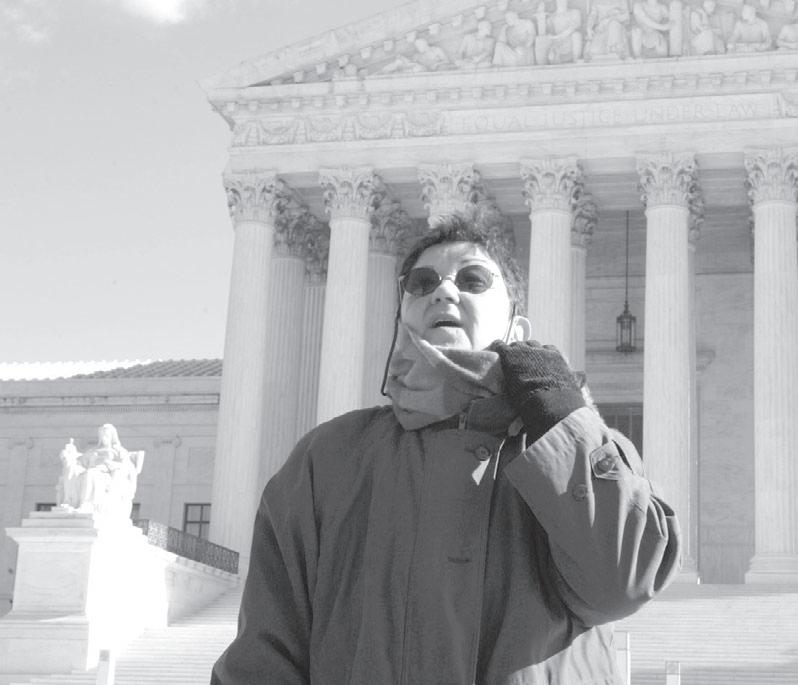
ence outside the Supreme Court, referring to the landmark school desegregation ruling.
McCorvey and Cano, who both spoke at the press conference, are backed by 33 women from 19 states who say they regret having had abortions; one of the
women had seven. Neither Cano nor McCorvey ever had the abortions at issue in their cases.
“I was never told what an abortion would do,” said McCorvey, the “Roe” in Roe vs. Wade. “I’m glad I didn’t have an abortion. My baby is alive - somewhere.”
McCorvey was 21 years old and pregnant for the third time when she sought an abortion. She agreed to be the plaintiff in a lawsuit seeking to overturn a statute in Texas that prohibited abortion unless it was necessary to save the life of the mother. The US Supreme Court decision in the case came after she had the baby. It was the third child she put up for adoption. Cano, who, like McCorvey, helped give American women an almost unlimited right to an abortion, said her “case was based on deceit and fraud.”
The Roe decision threw out most state restrictions on abortion, while the Doe decision permitted abortions through all nine months of pregnancy. The legal strategy being used in the women’s petition, which was received at the Supreme Court, is a “Rule 60” motion based on the Federal Rules of Civil Procedure. The rule allows for a decision to be set aside, in part, if “it is no longer equitable that the judgment should have prospective application” or for “any other reason justifying relief from the operation of the judgment.” -CNS
Gay families enrolment causes parent concern
School officials at St John the Baptist School in Costa Mesa in California, rejected demands from a group of school parents that the school only accept families who pledge to abide by Church teachings.
The parents’ call for a pledge was primarily in response to the school’s enrolment of two students this fall who are the adopted sons of a gay couple.
Eighteen parents signed a letter in December that said in part, according to a copy obtained by the Los Angeles Times daily newspaper, that their efforts were not “meant to be a radical or mean-spirited approach to Catholic education,” but instead a “straightforward assurance to any prospective parent that their child will be taught the fullness of Roman Catholic doctrine.”
around the world
Catholic school’s enrolment of gay couple’s adopted sons angers some parents
Father Martin Benzoni, pastor of St John the Baptist Parish, rejected the parents’ demands and released a new policy emphasising that a child’s education comes first and that a family’s background “does not constitute an absolute obstacle to enrolment in the school.” The priest, who could not be reached by Catholic News Service, told local reporters that the two kindergarten boys at the centre of the conflict had been baptised in the faith and deserved a Catholic education.
Father Gerald Horan, superintendent of schools for the Diocese of Orange, where St John the Baptist is located, told CNS in an e-mail that he agreed with the
Diocese disappointment
Nashville diocesan officials expressed disappointment with a Tennessee Supreme Court ruling allowing a $68 million lawsuit against the diocese to proceed even though the case concerns events involving a priest years after he left the active ministry.
The unanimous ruling on January 18 overturned two lower court decisions that the diocese was not responsible for the emotional distress alleged by two plaintiffs because of its actions regarding Father Edward McKeown.
The civil lawsuit alleges that the diocese covered up child sex abuse by Father McKeown before he was dismissed from
school’s administrators in opposing the “introduction of any moral scrutiny or conformity in school admissions policies.”
“If we are going to require statements of moral conformity, then they need to apply the expectation and demand for conformity to all areas of the Church’s moral teachings,” he said, noting that a required moral pledge would also have implications for parents who are divorced and remarried, those who use birth control and those who live together without being married.
“It is my belief that our rule is to teach, not to enforce, moral precepts and religious doctrine,” he added. The group of angry
permanent ministry in 1989. It adds that the diocese did not warn the community at the time of his dismissal of the danger he presented to children.
In the lawsuit, the plaintiffs cite alleged abuses that occurred from 1995 to 1999. Father McKeown is currently serving a 25year sentence after pleading guilty in 1999 to charges of child molesting and rape. Rick Musacchio, diocesan spokesman, said the diocese will continue fighting the lawsuit.
Live with hope
A world lacking hope ends up offering death as a solution to those who suffer, Pope John Paul II said. Meeting members of the Pontifical Council for Health Care Workers on January 21, the Pope said the Church is called to respond to “the most delicate and
parents said they were concerned that the enrolment of the gay couple’s children was a violation of Church teaching on samesex unions and was part of a campaign by gay and lesbian Catholics to gain greater acceptance in the Church.
William Donohue, president of the Catholic League for Religious and Civil Rights in New York, criticised the protesting parents in a press release. “To single out these kids because of their gay parents would be invidious,” he said. “You cannot burden the innocent.”
Donohue said priests are often asked to baptise the children of “morally delinquent parents” and, just as these priests do not condone the parents, “school officials at St John the Baptist are in no way condoning the lifestyle of gay parents.” -CNS
unavoidable questions that rise from the human heart in the face of suffering, illness and death.”
Even in the face of suffering, he said, people can draw hope from Christ, who died yet rose again.
“The modern world, which often does not have the light of this hope, suggests the solutions of death,” he said.
In response to those who would sell death as a solution to suffering, the Catholic Church has an obligation to proclaim the value of every human life, especially through the witness of those who care for the sick and dying, the Pope said. The sick, he said, have a “special mission” in the Church: “in union with the suffering Christ, they can cooperate in the salvation of humanity, increasing the value of their prayers with the offering of their suffering.”
Catholics care
The Vatican nuncio to the United Nations reported on January 19 that Catholic agencies were devoting nearly $500 million to victims of the tsunami disaster in the Indian Ocean.
Addressing a special session of the General Assembly at UN headquarters in New York, Archbishop Celestino Migliore said these efforts were being carried out in cooperation with the Pontifical Council “Cor Unum,” and were devoted to both emergency relief and longer-term projects.
Pope John Paul II has committed Catholic agencies “to act in a genuine gesture of solidarity to all people without exception in each nation touched by this enormous tragedy,” he told the UN diplomats.
The archbishop spoke at a session designed to focus attention on both the immediate problems created by the earthquake and tsunamis and the broader issue of strengthening the ability of the international community to provide effective, coordinated responses to future disasters.
In addition to reporting on Catholic efforts, Archbishop Migliore commended the response to the disaster by UN SecretaryGeneral Kofi Annan and UN agencies. “It now falls to the United Nations to become once again a great driving force, dedicated, courageous and humanitarian, as in the best moments of its history,” he said.
Archbishop Migliore said young children were the “most affected” of the tsunami victims, and tens of thousands were left orphans, in addition to 50,000 or more who were “swept away.”
Catholic agencies are placing special emphasis on “ways to bring help to surviving children in the zones worst affected,” he said.
Noting the quick response to the tragedy from so many quarters, the nuncio called it “a sign of the fundamental decency of the peoples of the world. It is clear that there exists - regardless of the things that separate us - a deep sense of our shared humanity and fragility in the face of such terrible events,” he added. -CNS
Weekly Mass a must
Attending Sunday Mass each week is a sign of a Catholic’s fidelity to Christ and an essential part of Christian living, Pope John Paul II said. “Participating in the Sunday Mass is not only an important obligation, as the ‘Catechism of the Catholic Church’ says clearly, but, above all, it is a profound need experienced by each of the faithful,” he said. The Pope focused on the importance of Sunday Mass during a speech to the Pontifical Commission for Latin America, which met at the Vatican to discuss “Sunday Mass, the Centre of Christian Life in Latin America.” The Pope said that bishops and priests must find more effective ways to communicate to the faithful the central place Sunday Mass has “in the Church and social life of men and women today.”
Page 13
Norma McCorvey, the “Jane Roe” in the Roe vs. Wade decision legalising abortion 32 years ago, stands in front of the US Supreme Court. Photo:CNS
A charming, delightful picture
movie
The Chorus (Les Choristes)
■ By Harry Forbes
If you felt the tears welling during such European period weepers as Cinema Paradiso and Life Is Beautiful , be prepared to bring out the tissues again for The Chorus (Les Choristes), a remake of Jean Dreville’s 1945 film, La Cage aux Rossignols (A Cage of Nightingales).
Directed by first-time writerdirector (and composer) Christophe Barratier, this is a glossily sentimental and heart-tugging French film about a failed middle-aged musician, Clement Mathieu (Gerard Jugnot), who takes a teaching job at a correctional house for troubled boys in the late 1940s.
When a school custodian is nearly blinded by one of the student’s vicious pranks, Mathieu knows he’s in for a handful. Nicknamed “Baldy” by the kids, Mathieu shows his mettle and wins their respect, particularly when he protects some of the offenders from the punitive principal, Rachin (Francois Berleand).
At one point, the boys break into his room, and discover music in his leather case. He’s furious at the intrusion, but eventually hits on the idea of having the boys overcome their occasional troublemaking and violent ways by forming a choir, under the disapproving eye of Rachin, who later takes credit for the idea when the choir comes under the favourable scrutiny of the school’s patrons.
Pierre Morhange (Jean-Baptiste
Racing Stripes
■ By David DiCerto
A zebra finds his inner thoroughbred and proves he has the heart of a champion in the delightful family comedy Racing Stripes
Directed by Frederik Du Chau, the charming feel-good fable blends live-action and computergenerated talking animal effects telling the story primarily from the point-of-view of its two-toned protagonist (think Babe with a bridle).
Frankie Muniz provides the voice of Stripes, a zebra who falls off a circus truck during a heavy rainstorm and is rescued by Nolan Walsh (Bruce Greenwood), a widower and former horse trainer who takes the foundling back to his Kentucky ranch. Walsh walked away from his past life after his jockey wife was killed in a horseracing accident. Worried that his
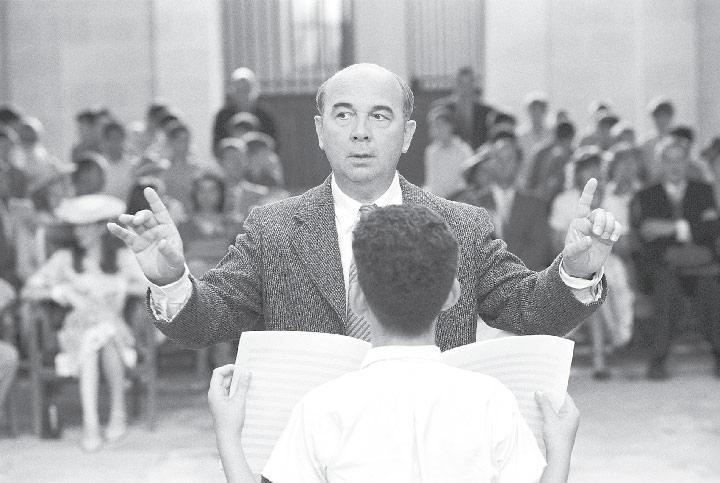
Maunier), one of the troublemakers, whose attractive unwed mother, Violette (Marie Bunel), works as a waitress, turns out to have an outstanding musical talent. (Maunier does his own singing.) Mathieu is clearly smitten with the lovely lady though shyness keeps him from revealing his attraction. When Morhange is punished by Rachin, Mathieu covers for him, and tells the mother the boy is merely at
the dentist. There’s also a cute tyke named Pepinot, who poignantly awaits his parents, not understanding they were, in fact, killed by the Nazis. Eventually, a seriously tough older boy (Gregory Gatignol) joins the school and threatens to cause real trouble. Unlike the others, he never succumbs to Mathieu’s melodic ministrations.
Barratier’s film about the healing power of music features first-
rate performances, including the children who are superbly cast, and heavenly singing by the boys once they get going - making this a surefire audience pleaser even as the setup is transparently manipulative.
Interestingly, overseas, the film is credited with bringing choral singing back into vogue among young people. Barratier has stated that all his films share the common
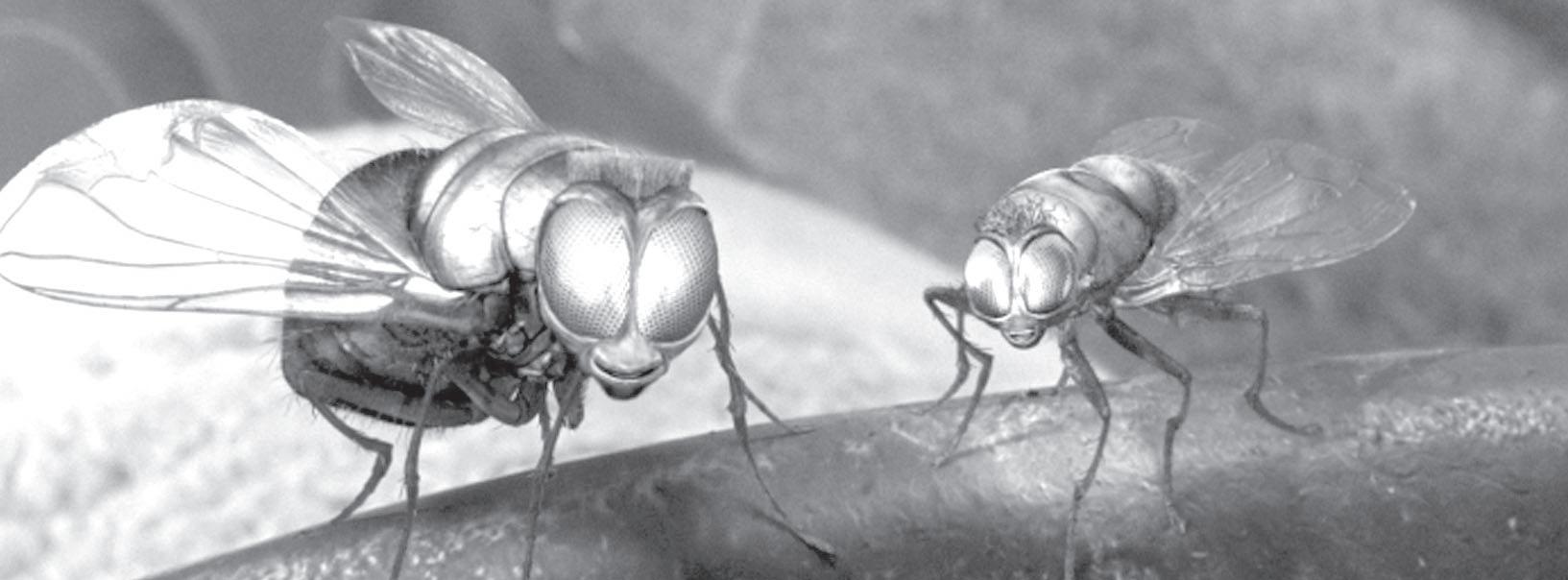
saddle-savvy daughter (a radiant Hayden Panettierre) could suffer the same fate, the overprotective Walsh forbids her to ride.
Stripes, who arrives on the scene not sure “who” or even “what” he is, grows up thinking that he is a horse and dreams of racing with the much larger colts at a neighbouring track.
Wendie Malick plays Clara Dalrymple, Walsh’s former boss
and the cold-hearted queen of the Kentucky racing circuit. Led by an imposing Man o’ War-like steed called Sir Trenton (Fred Dalton Thompson), her stable of super stallions derides Stripes for his lack of size, pedigree and exotic appearance. Their ridicule only makes the zebra more determined to show them that he is horse enough to run with the best of them. An
opportunity to do that arises when an old-timer at the track (M. Emmet Walsh) witnesses the zebra’s speed firsthand and urges Walsh to enter Stripes in a prestigious derby. Walsh refuses at first- especially when his daughter petitions him to let her be the jockey - but has a change of heart after a walk down memory lane orchestrated by Stripes’ barnyard buddies, including a goat (voiced by Whoopi
theme of one individual helping make the world more livable, and his latest - very much in the vein of Goodbye, Mr Chips and Mr Holland’s Opus - continues that admirable tradition.
Due to some crude language, a brief verbal suggestion of sexual impropriety, a few violent episodes, the USCCB Office for Film & Broadcasting classification is A-II - adults and adolescents.
Goldberg), a pretty filly (voiced by Mandy Moore), and a wise-butcrusty Shetland pony (voiced by Dustin Hoffman).
And though its crowd-pleasing ending is never much in doubt, the film is a fun and lively ride right out of the starting gate and should leave the competition in the dust. Humour is provided by Goose (voiced by Joe Pantoliano), a “hitbird” pelican - who never hits his target - on the lam from New Jersey’s feathered mob, and Buzz and Scuzz (voiced by Steve Harvey and David Spade), a pair of pooppreoccupied horseflies, who admit they are “the reason why they invented swatters.”
No matter what colour yours are, Racing Stripes is a winner.
The film contains some ethnic stereotyping and some mildly crude language and humour. The USCCB Office for Film & Broadcasting classification is A-II - adults and adolescents.
Review Page 14 January 27, 2005, The Record
Gerard Jugnot portrays conductor Clement Mathieu in the film The Chorus (Les Choristes).
Photo: CNS
movie
Horseflies Buzz, voiced by Steve Harvey, and Scuzz, voiced by David Spade, are pictured in a scene from the movie Racing Stripes. Photo: CNS
January 27, 2005, The Record
BUILDING TRADES
■ BRICK RE-POINTING
Phone Nigel 9242 2952
■ GUTTERS/DOWNPIPES
Need renewing, best work and cheapest prices. Free quote. Ph: Ad 9447 7475 or 0408 955 991 5008.
■ PICASSO PAINTING
Top service. Phone 9345 0557, fax 9345 0505.
■ PERROTT PAINTING PTY LTD
For all your residential, commercial painting requirements. Phone Tom Perrott 9444 1200.
CARER AVAILABLE
■ QUALIFIED CARER
Vacancy in own home to give 24 hour care to frail & aged citizens. Happy & peaceful environment, with lots of TLC. Respite long term all day care. Roleystone area. 9397 7037 mob 0402 265 952.
Classified ads: $3.30 per line inc GST 24 hour Hotline: 9227 7778 Deadline: 5pm Tuesday
CHANGE YOUR LIFE FOREVER
■ WORK FROM HOME
Around your children & family commitments. My business is expanding and I need people to open new areas all over Australia. Training given. Highly lucrative. www.cyber-success-4u.org
FOR SALE
■ VIOLIN
Guaneri copy Maple & Spruce valued & insured. $10,000. 9572 3118
■VIOLIN
4/4 Red German warm tone $2000. 9284 3747
FURNITURE REMOVAL
■ ALL AREAS Mike Murphy 0416 226 434.
HOLIDAY ACCOMMODATION
■ DUNSBOROUGH
Beach 250m, 3bdrm cottage, sleeps 7, available from Sat, Jan 15, very reasonable. Ph - Sheila: 0408 866 593
ADVERTISEMENTS
IN MEMORIAM
■ KIRKWOOD (MAUREEN)
In loving memory of my wonderful Mother, who died on 3 February, 1985. Twenty years have passed since that sad day, but you remain ever in my heart and prayers, Mother darling. Your loving kindness continues to be a comfort and inspiration in my daily life. May God be with you always, and dear Pappa also. May they Rest in Peace. Moira
MUMS ON A MISSION
■ SUCCEED FROM HOME Call Christine on Tel: 9256 2895
RELIGIOUS PRODUCTS
■ RICH HARVEST
BIBLES, Books, CD’s, Cards, gifts, Statues, Baptism & Communion Apparel, Albs, Vestments and much more. RICH HARVEST, 39 Hulme Court, Myaree, 9329 9889 after 10.30am.
OFFICIAL DIARY
RELIGIOUS PRODUCTS
■ THE HUMBLE MESSENGER
9225 7199. Shop 16/80 Barrack St (inside Bon Marche arcade), Perth.
THANK YOU
■ GRATEFUL THANKS
To St Jude for his answer to my requests.
Classifieds
Ph: Kylie 9227 7080 or A/h: 9227 7778
Etiquette:
Dear Sir, I often find myself at speeches and public functions, often holding a glass of champagne or white wine. When there is applause for speeches or announcements or awards you may appreciate that I find it quite difficult to join in without spilling the wine and embarrassing myself. What should I do?
Signed: Anxious
Dear Anxious, I have had many similar experiences. I suggest that you quietly undo one button on your shirt. At the critical moment, slide your free hand inside and slap it repeatedly against your stomach. This will have the effect of sounding authentic and also moving things along.
Yours etc. Uncle Bertie
JANUARY
28 Opening address for Annual Flame Congress, All Saints’ Chapel - Bishop Sproxton
FEBRUARY
2 Meeting with Catechumens and Candidates, Lockridge - Bishop Sproxton
6 Mass and Launch of Project Compassion, St Mary’s Cathedral - Archbishop Hickey Farewell Eucharist for Archbishop Carnley, UWA - Archbishop Hickey Mass of Commissioning for Leaders and Visitors of Basic Ecclesial Communities, Como - Bishop Sproxton
Sunday, January 30
8 Commissioning Mass for School Staff, Western Region, Redemptorist MonasteryArchbishop Hickey Mass and Commissioning of Foundation Principal for Newman College, ChurchlandsArchbishop Hickey Commissioning Mass for School Staff, North Eastern Region, Leederville
9 Ash Wednesday Mass, Como - Bishop Sproxton Opening Mass for St Charles’ Seminary - Archbishop Hickey
10 Council of Priests’ Meeting, Glendalough - Archbishop Hickey, Bishop Sproxton Commissioning Mass for School Staff, South Central Region, WillettonArchbishop Hickey Commissioning Mass for School Staff, Northern Coastal Region, WhitfordBishop Sproxton
PANORAMA a roundup of events in the archdiocese
ETERNAL WORD TELEVISION NETWORK: 1
- 2 PM ON ACCESS 31
Tune in for an inspiring discussion of the Virtue of Hope, by Fr Benedict Groeschel, demonstrated in the midst of suffering.If you appreciate EWTN on Access 31, please further this powerful means of evangelisation, by your prayers, financial contribution, and letting others know of this great resource. There are a number of free video lending libraries at metropolitan and country centres, the catalogues of which are posted on our web site: http://www.cathworld.org/worlds/org/media/. Please send donations and requests for tapes of any broadcast (or other EWTN) program, to The Rosary Christian Tutorial Association, PO Box 1270, Booragoon 6954. Enquiries: 9330-1170
Sunday January 30
GATE OF HEAVEN:
Please join us this Sunday at 7.30pm on 107.9 FM, Radio Fremantle, for more Global Catholic Radio. This week we will feature:
(1) – The Late Archbishop Fulton J. Sheen “Authority and Infallibility”
(2) – Fr. John Corapi “The Tradition of Prayer” Donations toward the program may be sent to Gate of Heaven, PO Box 845, Claremont, WA 6910.
Tuesday February 1
CENACLES OF THE MARIAN MOVEMENT OF PRIESTS
Recommences on Tuesday February 1 at St Anne's Church, Hehir St, Belmont at 10.30am and then on Tuesday February 8 at St Bernadette's Church, Glendalough at 10.30am.
Friday February 4
PRO-LIFE PROCESSION – MIDLAND
The First Friday Mass, procession and rosary vigil will commence at 9.30am with Mass celebrated at St Brigid’s church, Midland. The Franciscan Friars of the Immaculate will lead us. All are invited to witness for the sanctity of life and pray for the con-
version of hearts. Enq: Helen 9402 0349.
Friday February 4
ALLIANCE AND TRIUMPH OF THE TWO HEARTS
All night vigil of devotions and reparation to the Hearts of Jesus and Mary at St Bernadette's Church, Jugan Street, Glendalough. Commences 9pm with Holy Mass. Hourly rosary, hymns and devotions to the two Hearts. Concludes with Parish Mass at 7.30am followed by Rosary and Benediction. Enq: 9342 5845.
Friday February 4/5
ALL NIGHT VIGIL - EUCHARISTIC ADORATION
First Friday and First Saturday devotions to the Sacred Heart of Jesus and Immaculate Heart of Mary. Commencing 9pm Friday with Mass concluding with Mass 7am Saturday. Rosaries, Hymns prayers during the night. enq: Colin 9409 4543.
Saturday February 5
DAY WITH MARY
Our Lady Queen of Poland Church, 35 Eighth Ave Maylands 9am – 5pm. A video on Fatima will be shown at 9am. Includes Sacrament of Penance, Holy Mass, Eucharistic Adoration, sermons, rosaries, procession of the Blessed Sacrament and Stations of the Cross. Please BYO. Enq: Franciscan Friars of the Immaculate 9384 3311.
Saturday February 5
WITNESS FOR LIFE PROCESSION
The next First Saturday Mass, procession and rosary vigil will commence with Mass at 8.30am at St Anne’s church, Hehir St, Belmont. We proceed prayerfully to the Rivervale Abortion Centre and conclude with rosary led by Fr Paul Carey SSC. Please join us to pray peacefully for the conversion of hearts. Enq: Helen 9402 0349.
Sunday February 6
DIVINE MERCY
An afternoon with Jesus and Mary at St Mary's
Cathedral, Victoria Square, Perth on Sunday at 1.30pm. Holy Rosary and Reconciliation with Fr John Piumatti followed by Divine Mercy prayers and Benediction. Enq: John 9457 7771.
Wednesday February 9
ASH WEDNESDAY
The movie The Passion of the Christ will be shown at the Embleton Parish hall at 7.30pm and also on
Saturday February 12 at 7.30pm. All are welcome. Enq: 9271 5528 or 9272 1379.
Friday February 11
SPECIAL HEALING MASS
Fr Paul Raj of St Vincent’s parish, 114 Parmelia Ave, Parmelia invites you, your family and friends to a special healing Mass. 7pm for praise and worship and 7.30pm for Holy Mass. Mass celebrants: Fr Hugh Thomas, Fr Michael Merrifield and Fr Paul Raj. Praise and worship, Holy Mass, anointing of the sick and others who wish it.
Friday February 11
TORCHLIGHT PROCESSION
Around Lake Monger in honour of Our Lady of Lourdes starting 7pm with rosary and hymns. Congregating at the Northwest corner at the park end of Dodd St. Paths are wheelchair and stroller accessible. This Invitation is open to everyone. We especially invite families, those of Rosary Confraternities. No naked flames allowed. Enq: Judy Woodward 9446 6837.
Saturday February 12
YEAR OF THE EUCHARIST SEMINAR
From 10am until 3pm at St Bernadette’s Catholic Church, 49 Jugan Street, Glendalough. Speakers: Archbishop Hickey and Rev Father Doug Harris. Shared lunch. Tea and coffee provided. Enq: Fr Doug 9444 6131 and Dorothy 9342 5845.
Sunday February 13
BIBLE FORUM
Queen of All Saints Bible Forum of Religious Studies, Second Part of Four Part Series at All Saints Chapel, 77 Allendale Square St. George’s
Terrace, Perth on Sunday February 13 Bible Focus 3.00pm; Church History 4.00pm; True Devotion to Mary 5.30pm; 6.15pm Rosary and Benediction.
Sunday February 20
CHINESE NEW YEAR MASS
The Perth Chinese Catholic Community invite you to join in the Lunar New Year Mass. Main celebrant is Archbishop Hickey. Holy Family Church, cnr Thelma St & Canning Highway 4pm. Enq: Mrs Tsang 9383 7442 or Augustine 9310 4532.
Friday March 4
WORLD DAY OF PRAYER
The service was written by Polish women. The theme fo the service is "Let our Light Shine". We invite you to join in a service in your area. Contact your nearest church or check your local paper closer to March 4, for the time and place of your local service. City service will be held at Wesley Uniting Church, 93 William St, Perth at 1pm. The speaker will be Halina Szunejko from the Polish Community. For forther information: Margaret Doyle 9727 1990 or Kathy Coulson 9271 3806. kathycoulson@bigpond.com.au.
CROSS ROADS COMMUNITY
Term 1 – 31st January to 8th April for: Family & Friends Support Groups of Substance Abusers on Wednesdays 7pm – 9pm, Substance Abusers Support Groups on Tuesdays 5.30pm – 7.30pm & Friday’s All day Group for Substance Abusers 9.30am – 2pm, Bible Night: Tuesday’s 7pm – 9pm & Healing Mass: Fridays 12.30pm. Healing Masses
Beginning February: 1st Monday of month 7pm Church of East Fremantle, 2nd Monday of month 10am St Jerome’s Munster. No Healing Masses in January 2005.
classifieds
Page 15
The Last Word
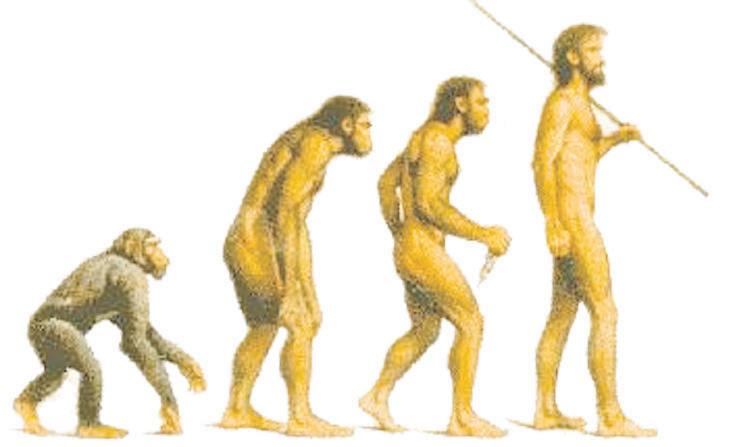
Darwinism is far from gospel truth amongst scientists. Its gaps are being filled in by “intelligent design” theory, reports William West.
Do you believe in evolution? If so, you might be surprised to find that you are a member of a rapidly
parison. Unlike many creationists, ID theorists do not reject evolution, they simply draw attention to the fact that its workings, while far more limited than Darwinists would concede, present a compelling argument for the existence of a mind behind it all.
gious nut or just plain thick”. She acknowledged that for most of the late 20th Century Darwinism had seemed “indubitable”, even to those who “have as little real understanding of the theory as they do of setting the video-timer”. But then came the ID theorists...
noted that 100 prominent scientists, including Nobel prize nominees, have been listed by the Discovery Institute as opponents of Darwin.
While The Spectator article acknowledges that many, if not the majority, of scientists, still support the theory of evolution in one form or another, it makes a telling point about the opposition that some evolutionists have inspired by tying evolution to atheism.
For those who would like to bone up on the basics of ID, you could start with the book Doubts About Darwin: A History of Intelligent Design by Thomas
and
Woodward
Phillip E. Johnson
or The Design Revolution: Answering the Toughest Questions About Intelligent Design by William Dembski and Charles Colson. A
what cells were made of... Today we know that a single cell is not the product of a simple chemical reaction. Even the very smallest cell is filled with exquisitely precise molecular machinery, highly complex and interdependent, to the extent that, in most cases, if even one machine were to cease functioning, cell death would occur very soon thereafter.”
Many leading scientific and intellectual journals and magazines have been forced to acknowledge the escalating warfare within the scientific community. Natural History magazine, for instance, carried an extensive special report.
Duelling with Darwin
dwindling group. And if you think that everyone is suddenly turning to biblical creationism, you would be wrong. Although there once only seemed to be two answers to the question about the origin of species, in recent years a new theory has become popular among scientists who believe that Darwinian evolution has just too many holes in it.
Known as intelligent design theory, or simply ID, the new approach combines the best of both of the previous explanations of the development of life on planet earth and attempts to avoid the pitfalls of both. ID is spreading so fast that it has gained many enemies. This is mainly because it makes plain the need for a God, or at least a superhuman intelligence.
By some commentators ID is described as the modern scientific equivalent of the design argument for the existence of God. Its two main planks are, firstly, gaps in the fossil record which most Darwinists reluctantly acknowledge, and secondly, the amazing way in which highly complex biological systems work together. In a word, ID theorists argue that biological systems are so complex that they make man-made machines, like the motor car or the computer, look positively pedestrian by com-
search on the internet will turn up many more.
ID theorists have had such an impact that even leading scientific organisations have been forced to take a position. They include bodies like the American Association for the Advancement of Science. Some groups are embracing ID with evangelistic fervour. For instance, at the University of California an Intelligent Design and Evolution Awareness (IDEA) Club has been established (acs.ucsd. edu/~idea). One commentator on the club’s site, Casey Luskin, points out one of the reasons why intelligent design is proving so popular - because it does not require any shared religious beliefs in the way that creation science does:
“It makes no statements about the identity of the intelligent designer,” he says, “but merely says that intelligent action was involved at some point with the origins of various aspects of biological life.
“So we’re back to a mind. When Charles Darwin and his contemporaries were living - in fact pretty much up until Watson and Crick elucidated the structure of DNA, it was generally thought that living cells were made of something called protoplasm. Protoplasm was just a name given to the jellolike substance that seemed to be
In Britain, The Spectator magazine ran an article late last year (republished in The Australian’s Higher Education Supplement) pointing out that many people are now becoming Darwin doubters. Author Mary Wakefield started out by sharing her astonishment when she discovered that a friend - “a man who has more postgraduate degrees than I have GCSE’s - had actually confessed that he did not believe in evolution. She continued:
“Last Saturday at breakfast with my flatmates, there was a pause in conversation. ‘Hands up anyone who has doubts about Darwinism,’ I said. To my surprise all three - a teacher, a music agent and a playwright - slowly raised their arms. One had read a book about the inadequacies of Darwin - Michael Denton’s Evolution: A Theory in Crisis; another, a Christian, thought that Genesis was still the best explanation for the universe. The playwright blamed the doctrine of survival of the fittest for ‘capitalist misery and the oppression of the people’. Nearly 150 years after the publication of Charles Darwin’s Origin of Species, a taboo seems to be lifting.”
Wakefield says that until recently to question Darwinism was to admit to being “either a reli-
“Over the last few years they have had a staggering impact,” she wrote. “Just a few weeks ago, they persuaded an American publisher of biology textbooks to add a paragraph encouraging students to analyse theories other than Darwinism. Over the past two years they have convinced the boards of education in Ohio, Michigan, West Virginia and Georgia to teach children about intelligent design. Indiana and Texas are keen to follow suit. They sponsor debates, set up research fellowships, publish books, distribute flyers and badges, and conduct polls, the latest of which shows that 71 per cent of adult Americans think that the evidence against Darwin should be taught in schools.
“Unlike the swivel-eyed creationists, ID supporters are very keen on scientific evidence. They accept that the earth was not created in six days and is billions of years old. They also concede Darwin’s theory of microevolution: that species may, over time, adapt to suit their environments. What intelligent design advocates deny is macroevolution: the idea that all life emerged from some common ancestor slowly wriggling around in primordial soup. If you study the biological world with an open mind, they say, you will see more evidence that each separate species was created by an intelligent designer.” Michael Behe, in particular, has had a strong influence on public perceptions of evolution theory through his 1996 book Darwin’s Black Box: the Biochemical Challenge to Evolution. But he is not alone. The Spectator article
The article suggests that much of the opposition to mainstream evolution could have been avoided if it had not been used as ‘proof’ of the non-existence of God. In support of this position it quotes Kenneth Miller, a Darwinian scientist and a Christian. In his book Finding Darwin’s God, Miller says:
“Evolution may explain the existence of our most basic biological drives and desires but that does not tell us that it is always proper to act on them... Those who ask from science a final argument, an ultimate proof, an unassailable position from which the issue of God may be decided will always be disappointed. As a scientist I claim no new proofs, no revolutionary data, no stunning insight into nature that can tip the balance in one direction or another. But I do claim that to a believer, even in the most traditional sense, evolutionary biology is not at all the obstacle we often believe it to be. In many respects evolution is the key to understanding our relationship with God.”
In other words, both ID and evolution are compatible with a belief in God. As to which is closer to the truth, stay tuned to this channel. But in future, anyone who wishes to address the question of the origins of life will at least have to be familiar with the theory of intelligent design.
William West is a freelance lournalist in Sydney. His email address is west@web29.com
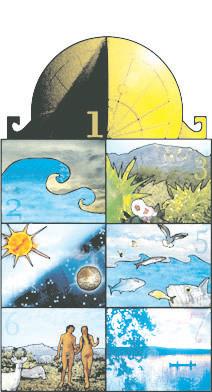
Page 16 January 27, 2005, The Record

































 ■ With Guy Crouchback
■ With Guy Crouchback




 ■ With Derek Boylen
■ With Derek Boylen











